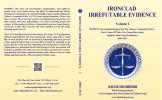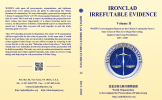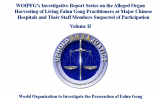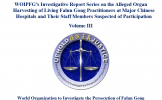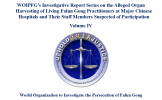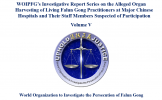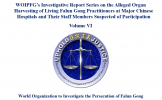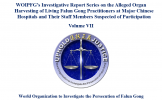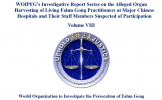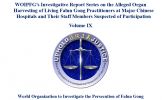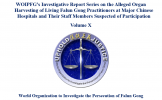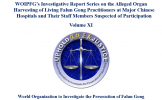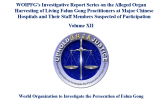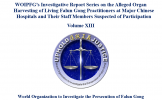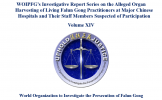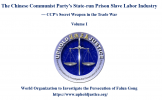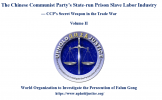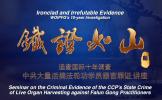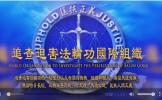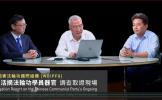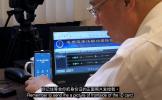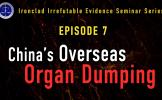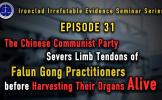Report on the CCP's Foreign Propaganda System, Ideology Infiltration and Spreading Hatred
Introduction
Background
1. The CCP's Global Foreign Propaganda Strategy
1.1 Spreading the CCP's Propaganda Abroad and the International Strategy
1.2 The Officials Who Are in Charge of Foreign Propaganda Tried to Avoid the Word "Propaganda"
1.3 The Key United Front Objects That Foreign Propaganda Organizations Should Target
1.4 Policies on How to Influence Foreign Media through Business Operations
1.5 Implementing Spokesperson System to Unify Statement
1) Confusing concepts and equating the CCP with China
2) Information Blockade
3) Chinese Communist Regime Instigates People's Hatred towards Falun Gong and Implements genocide policy against Falun Gong
4) Creating a False Facade to Avoid International Criticism
2. The Expansion of the Chinese Communist Party's Totalitarian and Dictatorial Ideology to the World
2.1 The Chinese Communist Party's Main Overseas Propaganda Media and Their Global Coverage
Xinhua News Agency's Goal: "Bring the Earth under Its Control"
China News Agency Is the Main Source of Information for Media in Hong Kong, Macao, Taiwan and Overseas Chinese- Language Media
China Radio International's (CRI) Programs Cover the World
CCTV-9 Broadcast Reaches 98% of the Earth's Surface
CCTV-4 Programs Basically Reach the Entire World
People's Daily's Overseas Edition Is Circulated in Over 80 Countries and Regions
China Daily Is Circulated in Over 150 Different Countries and Regions
10% of the Hits on the CCP Central Committee's Mouthpieces Came from Outside of China
2.2 Reinforce Overseas Propaganda via Western Media
3. Establishing the global ideology united front with a variety of styles and means
3.1 Infiltration through radio, film, video, books, magazines and comprehensive cultural exchange activities
Broadcasting
Propaganda toward Foreign Countries via film and video
Foreign Propaganda through Publications
Cultural Exchange
3.2 To defeat the criticism on human rights by "International anti-China forces," the Chinese Communist Party raises the banner of upholding human rights
3.3 Developing the Internet, Opening up New Channels for Overseas Infiltration
Conclusion
Introduction
The Chinese Communist Party (CCP) has considered the theory of Karl Marx, a native of Germany, as "The fundamental guiding ideology for founding the country and the party."1 After the CCP seized the power by armed force and violence in 1949, under the banner of "progressing" from "private ownership" to "public ownership,"2 it blatantly extorted privately owned money and wealth and quickly brought the entire national resource under its control. In addition, the CCP decided to make the so-called "progression" from "private ownership" to "public ownership" its fundamental task during its transitional period3 and had this decision written in the first constitution4 drafted by the CCP. Later on, it put Marxism-Leninism and the CCP's dictators' wills into the second Chinese Constitution as the "guidance" for the Chinese people of all nationalities,5 and then instilled it to all Chinese people and forced them to betray the great heritage of Chinese traditional culture and the traditional morality. During the CCP's despotic rule of over fifty years, 80,000,000 Chinese people have died of unnatural causes.6 To counteract the international communities' reactions, the Foreign Propaganda Office of the CCP Central Committee (which is called the Information Office of the State Council to the pubic) was established as the CCP's highest government body for coordinating its overseas propaganda. Its task is to make media outlets responsible for overseas propaganda follow the CCP's will in their campaign of "introducing China to the world," disseminate the CCP's ideology abroad, influence the public opinions and diplomatic polices of the Western countries, and lead the world media to cater to the CCP's needs.
The Chinese Communist Party (CCP) has considered the theory of Karl Marx, a native of Germany, as “the fundamental guiding ideology for founding the country and the party”. [1] After the CCP seized the power by armed force and violence in 1949, under the banner of “progressing” from “private ownership” to “public ownership”, [2] it blatantly extorted privately owned money and wealth and quickly brought the entire national resource under its control. In addition, the CCP decided to make the so-called “progression” from “private ownership” to “public ownership” its fundamental task during its transitional period [3] and had this decision written in the first constitution [4] drafted by the CCP. Later on, it put Marxism-Leninism and the CCP’s dictators’ wills into the second Chinese Constitution as the “guidance” for the Chinese people of all nationalities, [5] and then instilled it to all Chinese people and forced them to betray the great heritage of Chinese traditional culture and the traditional morality. During the CCP’s despotic rule of over fifty years, 80,000,000 Chinese people have died of unnatural causes. [6] To counteract the international communities’ reactions, the Foreign Propaganda Office of the CCP Central Committee (which is called the Information Office of the State Council to the public) was established as the CCP’s highest government body for coordinating its overseas propaganda. Its task is to make media outlets responsible for overseas propaganda follow the CCP’s will in their campaign of “introducing China to the world”, disseminate the CCP’s ideology abroad, influence the public opinions and diplomatic polices of the Western countries, and lead the world media to cater to the CCP’s needs.
Background
In the early times, the CCP’s main foreign propaganda channel was its mouthpiece, Xinhua News Agency. In December 1955, Mao Zedong, then the head of the CCP, ordered Xinhua News Agency to “bring the Earth under its control” and “to send its reporters to the different regions in the world as soon as possible and to disseminate its own news”. [7] By that time, the CCP had already shown its ambition of unifying the world with its ideology. Based on this goal, the overseas propaganda organs, each of which had “done things in its own way”, were brought under the unified leadership of the Foreign Affairs Group of the CCP Central Committee in August 1958, and the group leader was Chen Yi, then the Vice Premier of the State Council and the Minister of Foreign Affairs. [8] On June 4, 1989, the CCP crushed the students’ democratic movement through military force, which resulted in the world-shocking “June 4” Massacre. The CCP was strongly condemned for the massacre by the international communities, including the overseas Chinese people. [9] In July of the same year, the top leaders of seven countries, including the United States, France, Great Britain, Germany, Japan, Italy, and Canada, as well as the Chairman of the European Community held a meeting in Paris, and declared sanctions against the CCP; the sanction measures included ceasing the top-level political contacts with China, postponing the World Bank loans to China, etc. [10] At that time, the international environment underwent dramatic changes: the destruction of Berlin Wall, the fall, in succession, of the communist governments in East Europe and of the Soviet Union; in addition, the international human rights movement was at its peak. Under this general background, the CCP patriarch leader Deng Xiaoping proposed a foreign policy of “hiding our capacities and biding our time, [11] and waiting for the right time to come to make huge accomplishments”, aiming at cheating the international communities into lower their guards and executing his strategic plan of letting China accumulate forces and then dominate the world later. To foster a “good” image, walk out of the predicament, and step up its propaganda and infiltration to foreign countries, the CCP established, in January 1991, the Information Office of the State Council, as the highest body for coordinating its overseas propaganda works. [12] In March 1993, the Information Office of the State Council and the Foreign Propaganda Group of CCP Central Committee, which shared one work unit under two nameplates, were listed directly under CCP Central Committee and are controlled directly by the Party. [13] In the same year, the Foreign Propaganda Group was renamed as Foreign Propaganda Office. [14] All provinces, autonomous regions, and municipalities that are directly under the Central Government have also set up their own corresponding Foreign Propaganda Office (or Information Office). [15]
In March 1998, the CCP reinstated that the Information Office of the State Council and the Foreign Propaganda Office of the CCP Central Committee are still one work unit with two nameplates and are under the direct leadership of the CCP Central Committee [16]. In April of the same year, Zhao Qizheng, then Deputy Mayor of Shanghai, was promoted to the director of Foreign Propaganda Office [17]. But this office is still called the Information Office of the State Council to the public, so as to have an even more strategic ideology infiltration through means of providing information, making foreign contacts, helping the spreading of the media, serving as a liaison, etc. Besides the Secretary Bureau, which is in charge of documents management and administrative affairs, and the Personnel Bureau, which is in charge of personnel management and training for its affiliated branches, there are seven other bureaus established directly under this office, [18] and each of the bureaus has its own function while sharing the same goal -- to spread the CCP’s intentions abroad.
On July 20, 1999, the CCP and Jiang Zemin declared their suppression of the populace who believe in “Truthfulness-Compassion-Forbearance”. Jiang said, “How could it be possible that Marxist theory, the materialism and atheism believed by our Communists would not be able to defeat Falun Gong's teachings?” “If indeed that was the case, wouldn't it be a big joke?”[19] This time, the CCP learned the lesson of being sanctioned by the international communities after the “June 4” Massacre in 1989, and it also put into use its knowledge of torturing people and the cruel means that it has accumulated over its history of near one hundred years. In the persecution of Falun Gong populace, the CCP has gradually changed from an overt way to a covert way, so the persecution has appeared to be even more deceiving to the public. Over the nine years, the Foreign Propaganda Office of the CCP Central Committee has been actively following and participating in the persecution; it has used many means, such as holding press conferences, having culture exchanges, using internet, radio, and television, publishing books and other materials, etc., to spread the lies to the international societies so as to defame Falun Gong, incite people to hate Falun Gong, justify the crimes that the CCP has committed against Falun Gong practitioners and use various means to make the international communities keep silence in front of the large-scale, genocidal persecution against people’s belief.
This report consists mainly of the investigation findings regarding how the Foreign Propaganda Office of the CCP Central Committee (interchangeable with the Information Office of the State Council) has used various foreign propaganda channels to disseminate its communist despotic ideology and carry out the persecution of human rights.
1. The CCP’s Global Foreign Propaganda Strategy
The CCP’s foreign propaganda can be considered as a gunpowder-free warfare that is carried out in the Post-Cold War era. It attacks on the Western democracy initiated by the remaining communist dictatorship. In cooperation with its Global United Work Front Strategy, the CCP's goal is to gain supremacy in ideology control over the Western society. For example, Zhao Qizheng, the director of the Foreign Propaganda Office of the CCP Central Committee has considered the CCP’s foreign propaganda as an “undertaking of winning over public opinions” and a “struggle”. Zhao said, “During this struggle, [we] need to make best use of the favorable opportunities, actively launch the campaign, favorably control the warfare, try to take preemptive measures, and try to dominate the overseas media. Our goal is to have the overseas media follow our steps. … We need to actively promote China to the United States and other important Western countries so as to guide the world media; this needs not only a higher mastery of the art, but also a unified overall strategy. It should be even more so that we intentionally allocate our resources to the important regions and countries, make a full play of our strengths, focus on important aspects, make unremitting efforts, so as to make breakthroughs in those important countries, targets, and media, etc.”[20]
1.1 Spreading the CCP’s Propaganda Abroad and the International Strategy
After the “June 4” Massacre in 1989, Jiang Zemin, then the General Secretary of the CCP, said, “Foreign propaganda is a work of winning over public opinions,” and “Doing well in foreign propaganda is a work of strategic significance to our party and nation.” [21]
On February 26, 1999, in the CCP’s National Conference of Foreign Propaganda, Jiang Zemin, who appointed himself to represent the CCP and the State Council, conveyed the greetings to those involved in the work of foreign propaganda, and acknowledged that they have made “good achievements” in helping the CCP foster a “good image” and “improve the external environments of public opinion”. He also pointed out that the foreign propaganda was “a work of strategic significance, and the CCP Central Committee has always considered it very important”, and that it needs to put great effort in promoting the “tremendous achievements” that the CCP had made during the fifty years after it came into power; it should “obey and serve the Party’s overall strategy”, obey and serve the “overall foreign strategy”, and should definitely “focus its effect on enhancing the foreigners’ understanding and supports”. [22]
In the end of October 1999, before his state visit to France, Jiang Zemin was interviewed by the chief editor Alain Peyrefitt of a French newspaper, Le Figaro, for a writtenreport. Jiang took advantage of the opportunity and personally proclaimed Falun Gong as an “evil cult”, [23] and thus set the tone for the CCP’s mouthpieces to defame Falun Gong. This unified statement is still being used up to now.
In March 2000, Guo Jingzhe, the Editor-in-Chief of China Radio International (CRI), when sharing his anti-Falun Gong understandings in the area of foreign propaganda work, said, “Whoever can first let people know the important news in the world, will win over more people, and otherwise, will lose the people. The timing effect of the news is for sure not just a pure technique issue, but also a political one that is concerned with our competing with the Western media for readership and audience. …When reporting China’s exposing and denouncing ‘Falun Gong’ to the foreign countries, we (initially) just copied what had been used in China, and used some specific technical terms, and as a result, we had great difficulties in letting the foreign people understand and accept it. Later, when we clearly pointed out that ‘Falun Gong’ was an evil cult in our foreign propaganda, the foreign people immediately understood and accepted it. This is helpful to win over the international public opinion…” [24]
On January 25, 2000, the National Conference of Foreign Propaganda was held in Beijing. In the conference, the director of Foreign Propaganda Office of the CCP Central Committee and Information Office of the State Council, Zhao Qizheng gave a summary talk. He required attendees to “actively express China’s opinions, according to the changes in the international public opinion. The personnel in the field of foreign propaganda need to do more research, make plans, explore and learn the rules; and improve the efficiency to do better job.” The officials from all over the country, who are in charge of foreign propaganda in their respective regions, the officials and spokesmen from the CCP Central Committee and other offices under the state council, and some officials from Chinese embassies and consulates attended the conference. [25]
From January 13 to 15, 2001, the National Conference of Foreign Propaganda was held in Beijing. In the conference, the director of Foreign Propaganda Office of the CCP Central Committee and Information Office of the State Council, Zhao Qizheng emphasized that “(we should) create a favorable international atmosphere for public opinion, according to Jiang Zemin and the CCP Central Committee’s requirement on foreign propaganda.” [26]
In 2003, the deputy chief editor of Xinhua News Agency, Xia Lin said in an article titled “The Power of the Mouthpiece” that “information is a kind of strategic resource. Whoever has the control of information source and media—international radio, satellite TV and internet, will have the power to influence the whole society, and is able to take over the dominant and preemptive position in the battle of ideology.” [27]
In 2004, in a speech at China Foreign Affairs University, the director of Foreign Propaganda Office of the CCP Central Committee, Zhao Qizheng also mentioned the issue of “taking over the dominant and preemptive position”. He said, “Media reports may not be 100% objective.” “Whoever has the dominant position in reporting, will get the support and understanding from the international community and the public, thus will have the preemptive opportunities.” “The so-called dominant position means to have others believe in your opinion and news. The propaganda as a strategic weapon in the fields of politics, foreign affairs, economy and commerce has been used by every country and played an important role in history.” [28] On May 13, 2004, in a speech at Tsinghua University, Zhao Qizheng said that “global propaganda” is one of the overall tasks in CCP’s strategic view. It is the “soft power” and “an important component of our nation’s composite power.” [29]
On September 2, 2004, in the celebration of 60th anniversary of Xinhua News Agency Launching International English Broadcasting, the head of the Propaganda Department of the CCP Central Committee, Liu Yunshan required Xinhua News Agency to “focus on the task of making itself accepted and referred by the media in the countries and regions who have important influence on international public opinions and play important roles in international community” and “do research on and make plans for each country and area one by one.” He also required Xinhua News Agency to strengthen contacts with mainstream media in foreign countries and try its best to “enlarge the global coverage”; “expand our occupation on the battlefield of international public opinion;” when reporting the hot issues and important events inside and outside China, Xinhua News Agency needs to “be in the leading position, preoccupy people’s view, and take the initiative of influencing and leading the international public opinion.” [30]
1.2 The Officials Who Are in Charge of Foreign Propaganda Tried to Avoid the Word “Propaganda”
In 2004, the research group of “Research on efficient foreign propaganda” of Xinhua News Agency claimed that “The media outlets in charge of foreign propaganda can do many things in the struggle with foreign public opinion regarding the sensitive issues such as human rights, Taiwan, Tibet, Xinjiang, the argument that China is a global threat and the issue of Falun Gong, but we must conduct things according to the rules of information dissemination, and need to pay attention to the art and strategy of propaganda.” [31]
In the same year, Zhao Qizheng talked about how he “introduces China to the world” in a speech at China Foreign Affairs University. He said “when people asked me what task we have in the future, my reply was to ‘introduce China to the world’. I didn’t use the word ‘propaganda,’ because it could well be a derogatory term. What we need to introduce to the world? It’s to explain China’s policy, to counter attack on China. It is as simple as that. We have a variety of (propaganda) methods to choose from.” [32]
In July 2005, the deputy director of the Information Office of the State Council, Qian Xiaoqian [33] was interviewed by reporters from Hong Kong Wenweipo. He mentioned that he doesn’t use the word “propaganda” in the work of Tibetan issue, of which he is in charge. Instead, he uses “Introduce Tibet, Introduce China” to explain Tibetan issues. He thought by using the word “introduce” the propaganda effect is “the most powerful and most convincing.” [34]
Out of the same concern, in Chinese official documents, the English translation for the propaganda department was changed from “Propaganda Department of the CCP Central Committee” to “Department of Publicity”; and for the same reason, “International Communication Office of the CCP Central Committee” became the official translation to replace “Foreign Propaganda Office of the CCP Central Committee”.
1.3 The Key United Front Objects That Foreign Propaganda Organizations Should Target
The research group of “the research on efficient foreign propaganda” of Xinhua News Agency believes “The main targets of foreign propaganda should be the middle and upper class in the target countries, including politicians, people in business circles and intellectuals because they control either the political or the economic power and have the influence on the ideology and public opinion of those countries. Our media outlets responsible for foreign propaganda should focus on the mainstream media in the target countries. Based on our own features and characteristics, we should enhance the communications and collaboration with them. Especially, we should make friends with the famous people in foreign media. We should have intimate relationship with them, and do well the work of foreign propaganda with their help.” [35]
“Moreover, overseas Chinese and Chinese students studying abroad are another group of people deserving attention from overseas propaganda departments… Presently, there are over tens of millions of overseas Chinese and Chinese students studying abroad; many of them have become part of the mainstream society, sometimes even quite influential elites. Foreigners generally learn about China through overseas Chinese. Therefore, overseas Chinese bridge China and the outside world in a unique manner.” [35]
In the speech at China Foreign Affairs University, the director of Foreign Propaganda Office of the CCP Central Committee, Zhao Qizheng claimed, “We also have communication with foreign media. We have very close relationship, not only with the big guys like Ted Turner, but also with Associated Press, Agence France-Presse, Reuters, the biggest publishing house in France, and German company Bertelsmann — the biggest publishing house in the world.” Zhao Qizheng also gave an example to show how he convinced Ted Turner, the founder of CNN to take off the footage of a young man standing in front of a group of tanks and trying to stop them from advancing in the Tiananmen Massacre event, which CNN had been using as news header with other footage. Zhao said, “Turner asked me ‘Is CNN good?’ and I answered ‘no.’ He then asked why. I said ‘in the beginning of your hourly news, there are a lot of footages of important international political events, and in one of them, a Chinese young man stood in front of tanks during the Tiananmen Square event. You have been showing this footage for 10 years.’ He said, ‘not just us. All TV stations broadcast the footage this way.’ I said, ‘it is just you. Other people stopped long time ago.’ He, then, said to the manager of department of international news who was next to him, ‘Why are you still showing this footage? There are similar events in America, too. You will see how I will punish you.’ Then I said ‘sentence him to death penalty with a reprieve and let him correct himself.’ At that time, I thought that Turner was joking, but later I heard that he really punished that manager and also deleted that footage.” [32]
China News Service, which is the national news press in China in charge of the foreign propaganda, organized “World Chinese Media Forum” in Nanjing between September 16 and September 18 in 2001. It is said that 150 high-ranking officials and 130 overseas Chinese media outlets from more than 30 countries and regions attended the conference. There were also over 60 Chinese media outlets inside China attending the conference. The officials, who are in charge of propaganda and “unified front” at each level of CCP, attended the conference and gave speeches. The topics of the forum included “What role overseas Chinese media should play and how they should position themselves?” “How can overseas Chinese media and the media in China enhance the communication between each other?” etc. The attendee discussed intensively and gave suggestions on the propaganda strategy about how to create a favorable international public opinion under the lead of CCP’s ideology. [36]
In 2003, the deputy head of the Unified Front Department of Huizhou City CCP Committee in Guangdong Province, Huang Qiongji said, “We need to take full advantage of being next to Hong Kong and Macao geographically, and enhance the connections with media in Hong Kong and Macao. We need to do better to make friends with the middle and upper class people in those media, and strengthen our effort in reforming them. We should focus on the communication with “four newspapers and two journals” in Hong Kong and Macao. We need to build up the good connections with the mainstream media.” Also, he asked to enhance the “unified front” and propaganda work to the foreign visitors. He said, “More and more foreigners will come to China for business or tour. We need to organize more activities to make friends with foreign investors, experts and foreign students studying in China.” [37]
1.4 Policies on How to Influence Foreign Media through Business Operations
Huang Qiongji, head of Department of Unified Front of the Huizhou City CCP Committee, advocates, “maximize effort to incorporate the unified front and foreign propaganda work into mainstream Western society…incorporate unified front and foreign propaganda work into economic exchanges; at the same time we should strengthen our contact with foreign media, especially the communication with the mainstream media in the US and the industrial groups of seven Western countries, pay attention to keeping up friendly relations with foreign media personnel stationed in China and having a deep friendship with them; sponsor some friendship-promoting activities in an organized manner…and through them create a front for overseas propaganda and expand the sphere of unified front and overseas propaganda work.” [37]
On September 23, 2003, during the 2nd World Chinese Media Forum, Liu Zepeng, head of China News Service gave good publicity of the policy of “borrowing a boat to go overseas,” which was, by having media inside China directly provide a special edition for overseas Chinese newspapers, disseminate China’s propaganda to foreign countries. He claimed that, “Right now, foreign media are vying for a spot in the Mainland China market, and they have enjoyed tremendous success,” and he further enticed that, “overseas Chinese media should take advantage of this situation and seize the opportunity…take advantage of your geographic affinity and seek development and business opportunities for your media while helping the Mainland Chinese media enter the world.” [38]
Wu Yurong [39] a Ph.D. graduate of the “scientific socialism” major from the Party School of the CCP Central Committee proposed in 2002, “overseas media, especially some transnational media corporations are in fact commercial institutions, and their ultimate goal is to make money. That being the case, we can restrict and influence overseas mainstream media through commercial regulations, for example, by adjusting business relationship with western media corporations, limiting or approving these corporations’ business activities in China or buying their stock to influence the decision makers of these corporations.” Wu Yurong also listed some examples of success, “During the mid 1990s, we made News Corp. end its anti-China BBC ‘World TV’ programs by allowing it to develop satellite TV in China; and by restricting “Disney” commercial activities we effectively suppressed Disney’s participation in the production of programs aiming at secession of Tibet.” [40]
In 1993, Rupert Murdoch, board chairman of News Corp. bought 63.6% shares of Hong Kong’s Star TV stock with 525 million USD (he bought the rest of the stock in 1995) [41]. Soon after that, he announced, “Star TV has constituted an unambiguous threat to totalitarian regimes in the world.” Within weeks after he made the speech [42], on October 5, 1993, China’s State Council published “Provisions on the Administration of Ground Receiving Facilities for Satellite Television Transmissions,” which stated, “individuals are not allowed to install or use satellite ground receiving equipments,” “local TV stations, cable TV channels and broadcast stations are all prohibited from transmitting overseas satellite TV programs.” [43]
In order to gain more market share in Mainland China, Murdoch changed his standing and tried to be in the CCP’s good graces. First, he firmly ousted BBC, which angered the CCP for broadcasting documentaries on the human rights condition in China [44]; on March 25, 1996, Star TV, 100% owned by News Corp., founded Phoenix Satellite Television Holdings Ltd. along with two Chinese companies. [45] The two Chinese companies are Today’s Asia Ltd. and Huaying International Corporation Ltd. Today's Asia Ltd. is under the management of formal high ranking official of the Central People’s Broadcasting Station, Liu Changle [46] (who is currently the chair of Board of Directors for Phoenix Satellite TV); and Bank of China owns Huaying International Corporation Ltd.. Phoenix Satellite TV began broadcasting on August 28, 1998.
On August 21, 1999, the Chinese News & Entertainment Channel (CNE), the London-based European broadcasting service of Phoenix Satellite TV began broadcasting officially in Europe, with coverage of 25 European countries.
On January 1, 2001, Phoenix InfoNews Channel and Phoenix North America Chinese Channel were officially launched. Phoenix Satellite TV successfully landed in the US, for which the CCP media claimed that “it marks that Phoenix Satellite TV has, to a significant extent, covered the whole globe.” [47]
In March 2001, James Murdoch, executive vice chairman of News Corp., son of Rupert Murdoch slanderously called Falun Gong “a dangerous and apocalyptic cult” during a business conference in Los Angeles, USA. He also accused some Western media and Hong Kong media for being enthusiastic about making negative reports on China. [48] After the news got out, many CCP media including the Legal Daily [48], the Liberation Daily, People’s Net [49], and China News Net (run by China News Service) [50] quickly followed it up and publicized his statement. However, according to a VOA report, “Some human rights activists think that James Murdoch said these things to please the Chinese government.” [51]
On March 28, 2002, Star TV under Star Group Limited [52] solely owned by News Corp. was allowed to broadcast on Guangdong cable TV network. This is the first time the Chinese government allowed a foreign TV channel to broadcast via Chinese cable TV network. The condition is that News Corp. assists CCTV-9 to land in the US and Europe. Rupert Murdoch said it’s “a milestone for the development of News Corp. in China” and “the beginning of greater success in China.” [53] News Corp. also stated in its statement that Xu Guangchun, director-general of the State Administration of Radio, Film and Television (SARFT) pointed out that News Corp. should have greater opportunities to grow in China, which is “encouraging.” [54]
The CCP official reports said, “The secret of success for News Corp. is to seek common points with the Chinese government and build a trusting relationship through long-term collaboration.” [53]
Between October 7 and 11, 2003, Rupert Murdoch and others from News Corp. were invited by the Foreign Propaganda Office of the CCP Central Committee (Information Office of the State Council) to visit China. On October 8, Rupert Murdoch was invited by Zeng Qinghong [55], principal of the Party School of the CCP Central Committee to “give a speech to high-ranking CCP officials in charge of ideological affairs.” Professor Yu Guoming from the School of Journalism, People’s University of China described Murdoch’s speech as “compiled through painstaking efforts and filled with flattering words,” from which he could “deeply sense” the speaker’s “desire and anxiety” to enter the Chinese media market. “Aside from Murdoch’s attempt to seek material gains,” however, “many arguments in the speech are poignant and accurate, and they are especially inspiring for us to understand the true value of the media industry.” [56] On October 9, Li Changchun, a member of the Politburo Standing Committee in charge of propaganda met with Rupert Murdoch, board chairman and executive of News Corp. and his group at the People’s Great Hall. Li Changchun expressed his hope that News Corp. “will make greater effort to help the world learn about China and China about the world.” [57]
One year later, on October 28, 2004, SARFT and the Ministry of Commerce jointly published Decree No. 44, [58] “Provisional Rules for Administration of Joint Ventures and Cooperative Enterprises of China and Foreign Countries Producing and Operating Radio and TV Programs”, which took effect on November 28 the same year. The Rules include “enterprises solely owned by foreign venture for making and operating TV broadcasting programs are not permitted,” “the legal representative must be appointed by the Chinese partner,” “the Chinese partner must own no less than 51% of the total stock in a joint venture,” “joint venture enterprises must not make programs on current affairs and political news or similar special feature programs or special column programs,” among other strict rules.
On March 4, 2005, SARFT issued a “Notice on Administering Decree No. 44,” [59] which emphasized that the production of TV programs has a strong “ideological nature,” and [the government] must be “in control of the content,” be aware of the political inclination and background of the foreign partner to prevent “unhealthy foreign ideology and culture from entering the field of program making in the form of joint-venture.” The CCP media soon released news, stating, “This means Sony, Viacom, News Corp. and other foreign film and TV moguls that have already had joint-venture plans in place in China will not be able to expand their film and TV making business within a short period of time.” [60]
On July 13, 2005, Tian Jin [61], deputy head of SARFT emphasized during a national overseas work meeting, “To intensify and strengthen radio, film and television propaganda overseas is the critical requirement to oppose (combat) westernization, separation, infiltration; safeguard state security, strengthen the defense system on the battle ground of public opinion control…the CCP Central Committee and the State Council have always paid close attention to the administration of overseas satellite TV. The Central Committee leaders have given numerous important instructions…We must ensure all satellite TV signals in the jurisdiction area from permitted foreign sources come from the central monitoring platform. This is an inflexible yet simple and clear standard for judging the administration level of various film and TV departments on their control over foreign satellites.” [62]
In August 2005, Beijing officially canceled its plan to allow Murdoch’s News Corp. to expand its broadcasting in various parts of China. [63] On September 19, Bloomberg.com published an article “Murdoch Says News Corp. Has Hit ‘Brick Wall’ in China,” which mentioned that during a New York meeting organized by former US president Clinton, Murdoch admitted that New Corp.’s plan to enter Chinese market was in trouble. He also mentioned that the CCP authorities made promises before but again shut their doors on foreign media corporations. It seems Murdoch has yet to understand that the CCP always wants to unify the world with communist ideology and “bring the earth under its control;” [7] it will only try to “expand its occupation on the battlefield of international public opinion,” [30] and there is no way that the CCP will ever give away the media front.
The true lesson News Corp. has learned is just as the Economist reported, “a decade spent investing time and money to build relationships in China seems to have done Mr. Murdoch little good. Having milked Star TV for its technical expertise, the Chinese [the CCP regime] may well feel they no longer need him.”[64]
1.5 Implementing Spokesperson System to Unify Statement
Since 1993, the Foreign Propaganda Office (the Information Office of the State Council) has been in charge of the press release of the State Council and the coordination of press spokespersons from different departments of the State Council. On December 28, 2004, Zhao Qizheng, head of the Foreign Propaganda Office officially announced that the three-tier news release and spokesperson system had basically been established in the Chinese government. It refers to the news release and spokesperson system of the three tiers, which are the State Council Information Office, various departments of the State Council and the provincial governments. [65]
Obviously, the CCP set up the press spokesperson system in order to, through press release, more effectively give unified statements in their propaganda, cover up human rights abuses, fabricate lies, instigate hatred, and at the same time block any information detrimental to the CCP “good” image.
1) Confusing Concepts and Equating the CCP with China
Spokespersons for Chinese embassies and consulates abroad have long been twisting facts and confusing right and wrong. Whenever there are people criticizing China’s human rights situation and condemning the brutality of the CCP, they would slanderously accuse them of being “anti-China” forces. Here are two examples:
Case 1: On January 16, 2001, Professor Zhang Kunlun, who holds dual citizenship of Canada and China, said during an interview with Canada TV that he returned to China to teach in April 1996. [66] After July 20, 1999, he was arrested many times and cruelly tortured because he practiced Falun Gong. Chinese police officers shocked him with high-voltage electric batons. Zhang Kunlun said, “One police officer with the surname of Zhang said, ‘If you practice Falun Gong, we don’t have to take any responsibility for you. If you are beaten to death, we can tell the public that you have committed suicide.’” Zhang Kunlun was forced to attend brainwashing classes and write repentance statements to renounce his belief. He was also extorted 10,000 RMB Yuan. [67] Two days later, the spokesperson for the Chinese Embassy in Canada attacked Zhang Kunlun’s press conference and slanderously accused the Canadian government, NGOs, the Canadian people and the international community that showed support to Professor Zhang of “stirring up a new wave of anti-China campaign and damaging the relationship between China and Canada.” [68]
Case 2: On January 28, 2005, the press spokesperson for the Chinese Embassy in Australia made a speech, in which he called the Nine Commentaries on the Communist Party “anti-China articles.” The Nine Commentaries expose how the Communist Party has brutalized the Chinese people and destroyed Chinese culture during its 56-year rule; he also labeled Falun Gong practitioners’ efforts in clarifying the truth and exposing the genocidal persecution of belief by the CCP as “instigative anti-China activities;” he slanderously called Falun Gong, “a counter-revolutionary organization engaging in political activities against China.” [69]
2) Information Blockade
On November 23, 2003, based on the “Notice on improving and enhancing news reporting of unexpected domestic incidents” from the CCP Central Committee Office and the General Office of the State Council, China Ministry of Justice issued Document Sifatong [>2003] No.135, entitled “Instruction on reinforcing the propaganda work in justice and administrative system.” It was emphasized in this document that “the judiciary organizations of all levels must strictly follow the requirements of the Foreign Propaganda Office of the CCP Central Committee and the Information Office of the State Council when it comes to reporting unexpected domestic incidents towards outside of China.” “You must take the initiative to report the unexpected incidents to your local CCP Committee, the propaganda departments of local government and your superior judiciary and administrative organization right away. Then you must ask for and follow their instructions on how to report these incidents. As a rule of thumb, you do not publicly report any unexpected incidents occurring within any judiciary or administrative system, mainly including major accidents at production plants, judiciary or human rights issues, the situation of critical prisoners and ‘Falun Gong,’ etc.” [70]
On June 27, 2005, the Propaganda Department of the CCP Committee at North China Electric Power University issued a memo titled, “the regulations of reporting unexpected incidents occurring at North China Electric University.” Three regulations are specified in the memo; “First, based on the verified instructions on our news reporting and the school leaders’ orders, we have created news reporting regulations and started to closely watch and manipulate the public opinions inside and outside the campus. Second, every news broadcast script must be reviewed and approved by the university CCP Standing Committee or by the university’s leaders before it can be published. Third, without the approval of the university’s upper management level, the following unexpected incidents must not be reported, e.g. incidents that involve foreign embassies and consulates in China, foreign diplomats, foreign students; incidents that involve Hong Kong, Macao or Taiwan; major incidents that involve Chinese ethic groups, religion, human rights or “Falun Gong;” and group incidents that involve ‘illegal rallies,’ student movements, riots or other types of group incidents.” [71]
After the big earthquake of magnitude 7.8 hit Wenchuan County, Sichuan Province at 2:28 pm on May 12, 2008 Beijing Time, four report planning meetings were held in China News Service on the same day and the day after. "Reporting guideline was sent out three times, requesting branch offices in the disaster zone to follow the message of Central government, so as to report in concert with headquarter and other offices both inside and outside of China." "The China News Service re-published news on Central Politburo Standing Committee Meeting twice in time, and also reprinted the important articles from media with authority such as People's Daily and Xinhua New Agency, etc. Key data like casualties were released following instructions strictly and sensitive issues were handled with cautions." [72]
According to the Central News Agency correspondent Ren Wenyi's report from Taipei on June 16, 2008, a human rights advocate Huang Qi from China's Sichuan Province was arrested in Chengdu on June 10. His mother Pu Wenqing was notified on June 16 that Mr. Huang was charged with "holding state secret illegally" and would be in detention for one month. Ms. Pu said that his son went to distribute relief goods after the Sichuan earthquake. "He stayed in the disaster zone everyday and never came out." Yet it was unbelievable that the authority accused him of holding state secret unlawfully. Some media reported that Huang Qi's arrest was due to his statement about grievance of the parents whose children died in the earthquake because of poor quality school buildings. [73]
3) Chinese Communist Regime Instigates People's Hatred towards Falun Gong and Implements Genocide Policy against Falun Gong
In order to justify its ruthless persecution against Falun Gong, Chinese Communist Regime has to instigate people's hatred towards Falun Gong by making vicious lies to vilify Falun Gong. The following example is a good illustration of one of CCP's many forms of hate propaganda: After 263 Falun Gong practitioners have been verified to have been persecuted to death in China, Falun Gong practitioners in San Francisco started a peaceful appeal on August 18, 2001 in front of the Chinese Consulate in San Francisco for 265 consecutive hours to urge China to end its ruthless persecution and to urge the world's help to rescue those Falun Gong practitioners under illegal custody and under the threat of death. [74] On August 27, 2005, the spokesman for the Chinese Consulate General in San Francisco made a public speech to convey their rage towards Falun Gong practitioners' public appeal. Moreover, he made false accusations that Falun Gong has caused 1,700 of its practitioners to die and caused countless families to fall apart." [75]
On July 22, 2002, Mr. Xie Feng, the China news spokesperson in the U.S. urged the international society to "condemn," "stop," and "eradicate" Falun Gong in a press conference. [76]
4) Creating a False Facade to Avoid International Criticism
On March 30, 2004, Information Office of the State Council published a white paper titled, "China's Human Rights Improvements in 2003." It says, "The local people's governments of all levels nationwide have started to have or improve their news spokesperson system so as to improve the Chinese people right to know the truth, to supervise the government and to participate in public affairs." [77] But the truth is that the truth about China's June 4 Massacre of college students at Tiananmen Square in 1989 or the truth about CCP regime's persecution against Falun Gong has never once been reported in any media in China as a result of the CCP's persistent control of all news reports. When a dictatorial regime tries to perfect its news spokesperson system, it has only one purpose --- to tighten its grip on information and speech. Since 1991, Information Office of the State Council has published eight white papers on China's human rights conditions in an attempt to build a false impression to avoid international condemnations on its long lists of human rights violations. [78]
According to the news report by Xinhua Net, the CCP's official mouthpiece, on March 30, 2005 about People's Daily (Overseas Edition) interview with Mr. Zhao Qizheng. Zhao said, "Every month mainstream Chinese and western media outlets receive several invitations from China's Information Office of State Council to press conferences in China. Almost all the issues they are concerned about, such as Taiwan issue and macroscopic economy in China, are covered by these press conferences." [79] In a reply to the question raised by a China Net reporter, Mr. Zhao said, "AP's top reporter in Beijing told me that the contents from the Information Office of State Council's press conference are all their headlines news." [80]
2. The Expansion of the Chinese Communist Party's Totalitarian and Dictatorial Ideology to the World
According to the news report by China Guangzhou Net on August 26, 2005, "For the past few years, the CCP and our country have been emphasizing overseas propaganda's positive effects on opening up our market, winning the international battle against antagonist forces, and winning the diplomatic battles. The Central-level overseas propaganda newspapers, magazines, radio stations, television stations and news agencies alone spend about several billions RMB Yuan every year (1 USD @ 8.2 RMB Yuan). All the provinces, cities and autonomous regions have also started to pour more manpower, resources and money into reinforcing their overseas propaganda." [81]
CCP has six main overseas propaganda media including Xinhua News Agency, China Radio International, the Chinese Central Television's international Chinese channel (CCTV-4), the international English channel (CCTV-9), China News Service (CNS in short) and People's Daily's overseas edition. Allegedly, "the Central-level media websites have become increasingly influential. They have become an important force of overseas propaganda." [82] Meanwhile, the United Nation has long ago included the news released by Xinhua News Agency as one of its main sources of reference materials." [83]
The CCP has secretly weaved an extremely huge "network" in front of people's eyes both inside and outside of China, through their effort of "hide one's capacities and bide one's time"[11] in over a dozen years, the CCP's ideology is now expanding and infiltrating to the outside world through this "network."
2.1 The Chinese Communist Party's Main Overseas Propaganda Media and Their Global Coverage
Xinhua News Agency's Goal: "Bring the Earth under Its Control"
As of the end of 2002, Xinhua News Agency's news reports supplied over 140 countries and regions and had about 5,000 overseas subscribing households. Some overseas mainstream media outlets are among its subscribers. They include the U.S.A. Today (U.S.) and Science magazine (U.S.), France's Le Figaro (France) and Paris Match (France), BBC (U.K.) and Daily Telegraph (U.K.) and Pyramid newspaper (Egypt). [82]
In 2007, the news products of the Xinhua News Agency were expanded to over 200 countries and regions. Overseas subscribers increased to over 14500; and special editions were offered to overseas readers in five languages including Chinese, English, French, Spanish and Indonesian. On average, there were 120 pages and more than 3000 articles printed each month. [84]
Xinhua News Agency claimed, "Xinhua News Agency's articles and photographs are transcribed about 1,000 times in overseas media daily." "Half of the news reported from AP, AFP and Reuters' China branch offices are transcribed from or are based on Xinhua New Agency's reports. The majority of overseas Chinese newspapers are subscribers of Xinhua News Agency." "Xinhua News Agency's reports are an important source of information for foreign media's branch offices in China, as well as overseas journalists stationed in China." [82]
According to Mr. Tang Runhua, Head of Xinhua News Agency's Research Institute, "In order to enhance the effectiveness of our overseas propaganda, Xinhua News Agency established a strategy to use domestic news reports in our main overseas propaganda. In 2004, 72% of our English reports were transcribed by foreign media and among them, 79% were China news report." [85]
In October 2007, at the 17th CCP National Congress, Xinhua News Agency was emphasized again as the "main propaganda channel to the outside world". In order to enhance its capability of influencing world opinion, vice chief editor Liu Jiang of Xinhua News Agency proposed to "make China News as the breakthrough of broadcasting to the outside world, and to make the Asia-Pacific region as the major battlefield of competition with the main western media." Considering the media effect on public, Liu Jiang said that "timely reporting is the key to form the influence power of a media", and he claimed that "in 2007, Xinhua News Agency's international news were faster than three main western media AP, Reuters and AFP with close to 200 pieces of first release report, and more than 220 pieces were faster than two of those three news agencies." [86]
China News Service Is the Main Source of Information for Media in Hong Kong, Macao, Taiwan and Overseas Chinese-Language Media
China News Service (CNS) is the main source of information for media in Hong Kong, Macao, Taiwan and overseas Chinese-language media. [80] CNS claimed that they had directly supplied articles to overseas Chinese-language media for 55 years. With the strong support from CCP government, CNS will play even bigger and more active role in foreign propaganda arena, and will continue leading the overseas Chinese-language media. [87] CNS supplies word and photo reports to 300 overseas Chinese-language media each day, and has contract with 40 overseas Chinese-language media to provide them with exclusive CNS news. Each year, CNS provides 8000 page layouts to about 20 overseas Chinese-language media. [88]
CNS Overseas Center is a professional news supply and layout agency under CNS for overseas Chinese-language media. According to CNS, it has been "in powerful function" in terms of "solid implementing China's foreign propaganda policy" since its establishment in 1996. In the end of 2002, the center started to provide original news comments and exclusive news reports to be published on various newspapers. Especially for its special column of "Current Affair Talk", the center has formed a news comment team and released one article per day in the past five years. Altogether they have produced 1460 articles, which were all adopted on Chinese-language media in New York and Los Angeles, and selectively used in Saint Paul, Paris, Vancouver and other areas. [89]
On October 11, 2006, CNS vice chief editor Xia Chunping visited the US Asian Culture Media Group in New York. He also signed article-supply contracts with several media underneath it including China Press USA (Qiao Bao), SinoVision Inc., Sino American Times, etc. [90]
China Radio International's (CRI) Programs Cover the World
China Radio International (CRI) broadcasts around the world in 43 different languages. By the end of 2006, more than 1100 total hours of programs were aired daily and covered the whole world. CRI has established 30 reporter stations globally in major countries and regions. [91] It has contracts with local radio stations or rents hours at local radio stations in more than ten different countries and regions. In addition, it has formed partnerships with radio stations and TV stations in many countries and regions around the world to which it sends over programs for broadcasting. [92]
CCTV-9 Broadcast Reaches 98% of the Earth's Surface
CCTV-9, CCTV's English channel is China's first TV channel targeting mainstream audience in foreign countries. Since its start on September 25, 2000, after five years of development, it has become CCP's English mouthpiece, broadcasting 24-hour per day globally. [93] Its signal, after digital compression, is aired through PanAm Satellite (PAS) 8, 9, 10 and AsiaSat 2 and 3S over the land and ocean in Asia, Australia, Africa, America, Europe, west Pacific Ocean and Middle East. It is then broadcasted through many different forms of partnership with cable TV stations in countries in these regions. [92] For example, CCTV-9 formed a partnership with News Corp. to have its programs broadcasted in its Fox Cable Network and Time Warner Cable Network in the U.S. [80]
CCTV-4 Programs Basically Reach the Entire World
CCTV-4, a Chinese-language TV channel, targets overseas Chinese and residents in Hong Kong, Macao and Taiwan. It broadcasts news programs around the clock. Its signals, after being digitally compressed, are broadcasted through many satellites. Basically, CCTV-4 has achieved its goal of reaching almost the entire globe through transmitted satellite signal and its primary target regions through the directly broadcast satellite signal. [94]
People's Daily's Overseas Edition Is Circulated in More Than 80 Countries and Regions
People's Daily's overseas edition is the CCP Central Committee's official newspaper. [95] It is one of the five CCP's main media for overseas propaganda. [96] Its target readers are overseas Chinese students and scholars, overseas Chinese and residents in Hong Kong, Macao and Taiwan. Besides China, it is also printed in New York, San Francisco, Los Angeles, Tokyo, Paris, Toronto, Sydney, Jakarta, Surabaya, etc. It is distributed in over 80 countries and regions around the world. [78]
China Daily Is Circulated in Over 150 Different Countries and Regions
China Daily is China's first nationwide English newspaper. Its target readers in China are foreigners staying in China, e.g. foreign diplomats in China, foreign business corporations in China, foreign news agencies' offices in China, foreign scholars and experts working in China and foreign tourists visiting China. Its target readers outside of China are government officials, scholars conducting research on issues regarding China, business and trade organizations and college libraries. In New York, London and Hong Kong, it publishes its North America version, European version and Hong Kong version, respectively. It is circulated in over 150 countries and regions around the world. [97]
20% of the Hits on the CCP Central Committee's Mouthpieces Came from Outside of China
People's Daily, Xinhua News Agency, China Radio International, China Daily, China Internet News Center and CCTV publish or broadcast news reports in many different languages. According to statistics in 2004, 10% of the hits on their websites came from outside of China. [80]
In 2007, total 7801 Mbps Internet bandwidth was connected to the major CCP central-level websites, which provide 930 news channels and 13817 special news programs. The readers were from more than 200 countries and regions. Out of over 100M page views everyday, 20% were from outside China. Among those websites, with 9 languages and 11 editions, China Net has become the main window of CCP's foreign propaganda. [98]
China Radio International's "CRI Online" is published in 42 languages and 48 phonetics over the Internet. According to incomplete statistics, close to 15000 websites world-wide have linked to the homepages of "CRI Online"'s various language editions. [91]
2.2 Reinforce Overseas Propaganda via Western Media
At the same time when Chinese Communist regime strengthened its overseas propaganda via its mouthpieces, in order to control foreign journalists in China to ensure that their reports do not go beyond the scope of the CCP's regulation, China's State Council issued Document No. 47 as early as January 19, 1990 – "Regulation stipulations on Foreign Journalists and Foreign Media Outlets in China." It was specified in this regulation that "Foreign journalists must get approval from foreign affairs departments, foreign affairs offices in governments at provincial, municipal and regional levels, prior to their planned interview with governmental departments or other work units, regions adopting 'open-up' policy or regions not yet opened up. Violation of the regulation will result in punishment of the responsible person(s) by Chinese public security organs based on the seriousness of the violation." [99] Correspondingly, Foreign Propaganda Office of the CCP Central Committee established Bureau One, which was, Information Bureau "to provide service for foreign journalists for interviews inside China" at the same time. [18] Let's take a look at how Chinese Communist regime provides such "service" for foreign journalists through the following examples.
After the outbreak of SARS (Severe Acute Respiratory Syndrome) in November 2002 in Guangdong Province, the Chinese Communist regime tried its best to cover up the real situation of the epidemic; as a result, China lost the opportunity to take precautions and preventions against SARS. In March 2003, SARS spread to different countries via Hong Kong. [100] On April 6 of the same year, Pekka Aro, an International Labor Organization official, died from SARS in Beijing. However, three days before his death, Minister of Public Health, Zhang Wenkang stressed again at a press conference for domestic and foreign reporters that "the epidemic has been under effective control" and "it is safe to work in China, to live in China and to travel in China." [101] On April 8, Dr. Jiang Yanyong, a surgeon of the military hospital, 301 Hospital, wrote to the U.S. journal TIME to expose the fact that China's Ministry of Public Health was covering up the true situation of SARS, cheating the public and international society. [102] Mr. Jiang became the main focus of global media the next day. Phone calls came in one after another from AP, Deutsche Presse Agentur and Agence France-Presse, trying to arrange an interview with Mr. Jiang. In the evening of that day, officials of 301 Hospital personally talked to Mr. Jiang and reminded him, "You cannot accept interviews by overseas journalists, as this is the rule set for military personnel." [103]
On April 10, WHO publicly criticized Beijing's epidemic reporting policy: "In Beijing, only a few hospitals report SARS cases on a daily basis. The tracking system is problematic. It will lead to the spreading of the disease." [104]
On May 7, three journalists of TIME who learned that Ministry of Public Health of China and SARA Prevention and Treatment Teamwork Group of WHO would investigate in Hebei Province in mid-May, went to Guancun Town of Gu'an County in Langfang City, Hebei Province to interview local peasants and took pictures. As soon as Bureau of Foreign Propaganda of Langfang City heard it, officials from the bureau rushed to Langfang City and "rejected their interview" with the excuse that these journalists "didn't go through due procedures." In the morning of May 8, two journalists of a Swiss newspaper arrived at rural area of Zhuozhou City directly from Beijing, the staff of local foreign affairs department in Zhuozhou City, after being informed, followed them for two hours and eventually terminated their interview activities. [105]
On May 21, Party Secretary of Hebei Provincial CCP Committee, Bai Keming received a report on "Foreign Journalists Violates Regulations and Goes to Hebei Province to Interview." He called Zhao Qizheng, director of the Foreign Propaganda Office of the CCP Central Committee. He expressed his viewpoints in this matter, "We may loosen our restrictions and allow foreign journalists to come to Hebei Province for interviews. We may show them the places they are allowed to see and let them report on how local officials help to prevent and treat SARS." The Foreign Propaganda Office of CCP Central Committee then passed the words to Department of Propaganda of Hebei Province CCP Committee. According to Xiang Jinke [106], vice head of Propaganda Department of Hebei Province CCP Committee and Director of Information Office of Hebei Provincial Government, "With the direct support from the Bureau One of the Foreign Propaganda Office of CCP Central Committee, we made immediate plans to invite foreign journalists to come to Hebei Province and conduct interviews on how we prevent and treat SARS in our province and our detailed treatment plans. The Foreign Propaganda Office of CCP Central Committee helped us invite fairly influential foreign media such as Associated Press Television News of the U.S., Reuters, Agence France-Presse and Asahi Shimbun of Japan… In addition, Foreign Propaganda Office arranged journalists from Xinhua News Agency, China News Service, CCTV and China Radio International to come along with foreign journalists. They took pictures for future reference." The place of the interview was designated to be Baoding City, because "In mid-May, Ministry of Public Health of China and SARA Prevention and Treatment Teamwork Group of WHO were conducting investigation in Baoding City, the city has relatively good facility and condition for receptions." [105]
On May 27, at noon, Party Secretary of Hebei Provincial CCP Committee Bai Keming gave an explicit instruction on how to prepare materials for the interview and how to answer questions from the journalists. He said, "Be sure to be prepared to answer all kinds of questions, including questions unfriendly in nature… When answering their questions, keep calm." Zhang Qunsheng, member of standing committee of Hebei Provincial CCP Committee and Head of Propaganda Department in Hebei Province convoked a meeting for all officials involved in different aspects of SARS prevention to study the instruction by Bai Keming.
In the morning of May 28, Deputy Director of Bureau One of the Foreign Propaganda Office of the CCP Central Committee, Guo Weimin led the journalists group and arrived in Baoding City. Allegedly, "when the journalists entered the province, leaders of foreign propaganda bureau of provincial and municipal levels were the only people leading the team at the entrance of highways," and "with meticulous planning and careful implementation, the journalists were allowed to ask any questions and were able to stroll around and conduct interviews freely… All these impressed foreign journalists as well as media outlets from central government favorably. Many media gave extensive coverage of the interviews in Baoding City."
Xiang Jinke, Vice Head of Propaganda Department of CCP Hebei Provincial Committee and Director of Information Office of Hebei Provincial Government, learned a great deal from whole planning of the interview. He said, "Inviting foreign reporters to interview us is an undertaking with heavy political and strategic connotations…. From the beginning to the end, Bai Keming, Party Secretary of Hebei Provincial CCP Committee was the general scheme planner and director; Zhang Qunsheng, member of standing committee of Hebei Provincial CCP Committee and Head of Propaganda Department of Hebei Province, was responsible for the detailed implementation." "As long as we take full advantage of our conditions to control public opinion and to be smart in using foreign resources, make constant breakthroughs in our notions, methods, schemes, and formalities, we will have immense potential in areas of foreign propaganda." [105]
This is only one of the numerous examples wherein Chinese communist regime takes advantage of foreign media in its overseas propaganda. In January 2005, Chinese communist regime re-publicized the so-called "Tiananmen Self-immolation" incident. "With the arrangement of Information Office of the State Council, a journalist team composed of reporters from Xinhua News Agency, People's Daily, China Radio International, China News Service, Hong Kong Wenweipo, Associated Press, and CNN interviewed the survivors of the "Self-immolation" incident at Zhengzhou Prison on January 18." [107] Soon after that, Associated Press published a report on the interview of "Self-immolation" survivor. Through the words of the interviewee, the report repeated CCP's lies and slanders defaming Falun Gong. This report has been transcribed by many overseas media. [108]
When the Chinese Communist regime staged the "Tiananmen Self-immolation" incident in 2001, an information source from inside the Ministry of Public Security revealed that "On the eve of Chinese Lunar New Year (January 23, 2001), after the self-immolation incident occurred, policemen detained six or seven journalists on the spot who are reporters for CNN, Associated Press, Agence France-Presse stationed in Beijing. The police impounded their videotape and negatives, and requested them to sign a statement to admit they had conducted illegal interview and would never make the same mistake again. They were released afterwards." [109] Four years later, when the Chinese communist regime made special arrangement for AP journalists to interview "self-immolation" survivor, the way AP journalists were treated and their behavior were completely different from four years ago.
In early 2008, Liu Qi, Politburo member of the CCP Central Committee, Party Secretary of the Beijing CCP Committee, chairman and the CCP Group Secretary of the Beijing Olympics Organization Committee, spoke about the foreign propaganda work related to the Beijing Olympics. He demanded that “CCP committee and government of each level should pay high attention to it. And the leaders of each level should learn how to deal with foreign media.” “We should make full use of the Olympic News Center and the Olympic News Center for non-registered reporters. Through the forms of press conference, special topic exhibition, and foreign reporter group interview, etc.”, enlarge the propaganda scale. “Serve and manage well of foreign reporters during their news coverage period inside China. We should enhance the interview route system, such as select interview sites purposefully, make thorough transportation plan and various other plans... initiate interview topics, arrange interview activities, prepare news materials, and so on. Really improve our abilities of interaction with foreign media.” [110]
The famous Belgian Sinologist Simon Leys (his real name is Pierre Ryckmans) wrote in his book Chinese Shadows: “Things being what they are, it seems to me that the feeblest hack should be able to write a report on China…without leaving his desk…[If] he actually decided to look at China for himself…He would make the same tours with that same guides, sleep in the same hotels, visit the same institutions, meet the same people who would tell him the same things…always conforming to an unvarying and unreal ritual…belonging to an abstract world conceived by Maoist bureaucrats especially for foreign guests…In the tours for foreign visitors, always superbly organized, anything that might be unpredictable, unexpected, spontaneous, or improvised is ruthlessly eliminated…Yet most travelers who ‘do’ China in this way…look favorably on their experience. There is plenty of variety in the trips and the days are more than full.” (Chinese Shadows, By Simon Leys, New York: Viking Press, P1-2) [111]
3. Establishing the Global Ideology United Front with a Variety of Styles and Means
3.1 Infiltration through Radio, Film, Video, Books, Magazines and Comprehensive Cultural Exchange Activities
Broadcasting
In September 2003, China Media Group (CMG) CCP Group member, the Director of China Radio International (CRI), CCP CRI Branch Committee secretary Li Dan stated during his interview by reporters, “During the Cultural Revolution, our international broadcasting (which was called ‘Radio Peking’ before the 90s) exported revolution. Most of the feedbacks from our audiences came from Vietnam, Laos, Cambodia, Malaysia, Philippines, etc. They were all carrying out revolutions at that time, so they all listened to our broadcasting on a daily basis for guidance on their revolution undertaking. Our program hosts became stars in their countries.”
Li Dan believed that, “The most significant advantage of China Radio International was the ability to penetrate border blockade under any circumstance, such as during war time, both sides definitely will take actions to block messages from opposing side penetrating into their own controlling territory, this is the so-called information blockade. Under such circumstance, television would need cable or satellite dish to be able to reach local audience, printed media could no longer be promulgated, except through air drops; as far as Internet is concerned, it could be completely sealed off through technical means. Yet, radio broadcasting could not be stopped, even with jamming, it can adjust its frequencies, therefore it has significant mobility, flexibility and broad space for maneuvering.” [112]
In September 1974, based on the bilateral cultural exchange between China and Canada, Li Dan was sent to study in Canada by the China Radio International. He said, “I did in-depth research and investigation on the western news broadcast. I started doing research also on our own news broadcast theory and practice. Based on the need and characteristics of our work, we planned to promulgate our propaganda in the form of news reporting.”
In 1984, Li Dan went to Stanford University in the U.S. as a visiting scholar. It was reported that the “Professional Journalists Project” Unit at Stanford University provided a hefty sum of scholarship, and Li Dan was representing China, so it was counted as on official business but self financed. Li Dan told reporters, “After a year, because we need to study and understand how U.S. Congress works, I transferred to the School of Communication at the American University in Washington D.C. I focused my main effort to practice news covering at the U.S. Congress, and I had fairly thorough understanding on the internal situation, internal channels, public rules, relationship between the Congress and the news media.” “I felt that I truly permeated into the cells of the American society, thoroughly and acutely understand the American social and inter-personal relationship.” [113]
I returned back to China in 1986, and mainly focused on how to achieve our goal in disseminating our propaganda to foreign countries through news broadcast.” [114]
Propaganda toward Foreign Countries via Film and Video
On April 15, 2004, the Foreign Propaganda Office of the Tianjin City CCP Committee (Information Office of Tianjin City Government) established the implementation details for the “Intensification of effort on propaganda toward foreign countries). This included “Consolidate resources of the entire city on propaganda toward foreign countries, establish inter-departmental cooperation mechanism for Foreign Propaganda, Foreign Affairs, Foreign Trade, Foreign Tourism, Culture, Taiwan Affairs, and Overseas Chinese Affairs, form a unified structure for the Foreign Propaganda. Make the focal point of Foreign Propaganda in sync with seeking overseas business and capital investment, as well as possible infusion of capital, technology and human resources.” “Make Europe, America, Northeastern Asia, Hong Kong, Macao, and Taiwan as our main objective,” “Fully utilize the video and film supply channel that we have established with the world renowned CNN (US), strengthen the topic selection criteria and policy, further improve the quantity and quality of supplied footage.” [115]
On February 2, 2005, the State Administration of Radio, Film and Television (SARFT) announced and issued the “Focal Point (Guidelines) on Radio, Film and Television Propaganda for 2005.” The focal points included “Improving the style, methodology, means for the foreign propaganda, fully consider the needs and custom of the overseas audience….significantly broaden the undertaking to push foreign propaganda of radio, film and television to the worldwide arena, execute all the details well to ensure the propaganda become an integral part of the local culture, accelerate the exchange and cooperation on a worldwide basis for our radio, film and television.” [116]
On July 13 of the same year, Tian Jin, a member of the CCP group at the State Administration of Radio, Film and Television, and deputy director of the Administration [117] emphasized at the National Conference on Overseas Radio, Film and Television Effort, “Intensify and strengthen radio, film and television propaganda overseas is the critical requirement for anti-westernization, anti-separation and anti-infiltration; safeguard state security, strengthen the defense system on the battle ground of public opinion control….Radio, film and television propaganda overseas is an essential and critical part of our Party’s foreign propaganda, and it is a global and strategic undertaking to serve the Party and the Nation.” [62]
On January 27, 2008, Wang Taihua, vice Head of the Propaganda Department of CCP Central Committee, secretary of the CCP group at the State Administration of Radio, Film and Television, and director of the Administration [118] made a speech at the National Conference for Directors in Radio, Film and TV System: “The primary political task in our system at present and in a later period of time, is to study further, propagate and carry out the main spirit of the 17th CCP National Congress... embed the core socialism values into various aspect of our work...hasten our steps to go outside... continue close cooperation with the work of foreign affairs, foreign aid and foreign propaganda...extend coverage in key nations, neighborhood countries and areas... actively explore the localization strategy...solid enhance the focus and effect of foreign propaganda.” [119]
Foreign Propaganda through Publications
China Foreign Language Publishing and Distribution Administration, semi ministry organization, is under the CCP Central Committee and is directly led by the Foreign Propaganda Office of the CCP Central Committee (the Information Office of the State Council). It is said that it is “a news publication agency that is mainly responsible for the Party’s and nation’s mission of foreign propaganda by means of books, periodicals and the Internet. China Foreign Language Publishing and Distribution Administration has a history of more than 50 years.” [120]
Yang Zhengquan [121], Deputy Director of the Foreign Propaganda Office of the CCP Central Committee, and Director and Party Group Secretary of the China Foreign Language Publishing and Distribution Administration said, “Over the past 50 years, China Foreign Language Publishing and Distribution Administration published and distributed nearly 1.1 billion copies of books and periodicals. They have been distributed to over 180 countries and regions of the world. They have contributed to the introduction of the new-born People’s Republic (of China) to the world.” [122]
In 1994, China Foreign Language Publishing and Distribution Administration specifically started a new journal International Communications, which was alleged to be a journal “taking the study and promotion of foreign propaganda as its responsibility” and “exploring the art of disseminating the image of China and seeking the channels to reach the whole world.” Its target readers are “personnel of media outlets in charge of foreign propaganda, China’s foreign propaganda professionals at central governmental, municipal and county level, all foreign affairs professionals in different ministries of the CCP Central Committee, faculty and students in the areas of foreign propaganda at universities, state level foreign affairs professionals.” [123]
Yang Zhengquan also said, “Doing a good job in the foreign propaganda through books and periodicals is the focus of the Administration. Books and periodicals are one of the main measures of conducting foreign propaganda.” “Dedicated to the promotion of Marxism, to the promotion of the socialism with Chinese characteristics,” “Creating a good environment of international public opinion, upholding the interest and maintaining the security of the country, are the fundamental purpose of our doing foreign propaganda.” [122]
In October 2004, Yu Yongzhan, Vice Director of General Administration of Press and Publication of People’s Republic of China, commented during an interview with a journalist that to carry out the strategy of internationalizing China’s publication activities “is a pressing political task...In the case of underdeveloped countries and regions and with the foreign propaganda publications that are highly political, we may use the non-trading approaches more often. In the case of developed countries and general publications, we may more often use economic trading approaches…Copyright transfer and co-publication should be the basic ways to internationalize China's publication activities." [124]
In late July 2005, Information Office of the State Council, and General Administration of Press and Publication jointly distributed a circular entitled “How to Implement the Plan of Promoting Chinese Books to the World”. The circular says, the Information Office of the State Council will provide financial assistance to foreign publishing agencies for their translation work when they purchase or are given free copyrights from domestic publishing agencies. [125] On August 30, Wu Wei, deputy director of the Third Bureau of the Information Office of the State Council said at the 2005 Beijing International Publication Forum, “Based on the success in financially assisting the French Publishing House to publish Chinese books, (we) timely introduced the Program to Popularize Chinese Books Abroad (also known as the PPCBA Plan).” Its main content is “by way of providing the translation fee, encourage foreign publishing businesses and agencies to publish and distribute books about China. [126] According to official reports in Chinese media, “Up until the 2nd half of 2004, our government has signed contracts with nine famous publishing agencies in six countries including US, UK, France, Singapore, Japan and Australia to provide about two million RMB Yuan of financial aid to help publish more than 110 types of Chinese books."[125]
Cultural Exchange
On September 1, 1999, the 1999 Paris-China Culture Week co-sponsored by the Foreign Propaganda Office of the Central CCP and United Nations Educational, Scientific and Cultural Organization (UNESCO) held an opening ceremony at the lawn in front of the headquarter of UNESCO. According to Chinese official media, “One of the major planners of this event, the director of the Information Office of the State Council, Zhao Qizheng was very satisfied with the outcome of this culture week… Zhao also answered questions raised by the French audience, including questions on reformation of Chinese state-owned enterprises, construction of market economy, unification of Taiwan and Mainland China, reformation of Chinese characters, the current status of news and press in China, the economical and cultural exchange between China and France, the construction of Three Gorges Dam, as well as outlaw of ‘Falun Gong’ organization in China.” [127]
Between August 24 and September 17, 2000, “Chinese Culture Touring America,” an event engaged in foreign propaganda was launched in the US. The Foreign Propaganda Office of the CCP Central Committee planned and organized this event, which was comprised of three parts: exhibition, art performance, and keynote speech. During the nearly one-month-long event, the Chinese cultural organizations visited nine major US cities. The Chinese official media claimed, “This event is China’s first successful trial in disseminating our propaganda to foreign countries by means of public relationship.” [128]
On October 28, 2003, CCTV and Association of Overseas Chinese in France jointly hosted an entertainment evening party “hand-in-hand.” The Chairman of Association of Overseas Chinese in France, Lin Jiazhe said in his open speech that he was very excited to have the opportunity to be part of the Chinese Cultural Year activities. He praised the CCTV to be “spiritual food for overseas Chinese in France.” [129]
In October 2003, Vice President of College of Journalism and Communication, Shanghai International Studies University, Guo Ke [130] wrote in his published paper, “the Information Office of the State Council spent a huge amount of money worth of 5 million dollars to launch various events in major US cities, which was meant to build public relationship. It has gained pretty good propaganda outcome.” [131]
On May 13, 2004, the director of the Foreign Propaganda Office of the CCP Central Committee, Zhao Qizheng stated in his speech at Tsinghua University, “Our global propaganda needs to get close to the cultural background and needs of the foreign audiences. It needs to be conducted through multiple channels in parallel: press release, newspaper, book, radio, television, internet, cultural exchange as well as foreign propaganda from the effort of our entire population.” When Zhao Qizheng talked about “cultural exchange,” he said, “No one could say no to culture or cultural exchange. We must reinforce cultural exchange.” [29]
On October 26, 2005, editor of State Administration of Foreign Experts Affairs Chen Weiyuan wrote in his article “What the ‘Chinese-French Cultural Year’ Had Brought to Us,” “The success of the Chinese-French Cultural Year is quite an inspiration for our overseas propaganda work. Taking the approach of cultural exchange in overseas propaganda will have a far-reaching and lasting effect and will be well received by the audience… Culture is a ‘soft’ component of our nation’s power. Cultural diplomacy is a ‘soft’ dissemination of our nation’s will. Compared with economical diplomacy and political diplomacy, cultural diplomacy is able to have our target audience unknowingly accept (our propaganda). Such cultural infiltration through subtle influence cannot be underestimated. [132]
3.2 To Defeat the Criticism on Human Rights by “International Anti-China Forces,” the Chinese Communist Party Raises the Banner of Upholding Human Rights
After the CCP seized the power and established its regime, for a long period of time, “human rights” in China was a taboo word for theoretical discussion. People dared not mention the two words “human rights.” Wang Mi, an editor in Sichuan People’s Publishing Company, said, “To regard human rights as a patent exclusively inherited and owned by the capitalists society restricts us from actively participating in human rights areas in the Untied Nation and is not beneficial to our fighting against human rights attacks from Western countries. During the late 80s and early 90s in the last century, western countries directed their human rights attacks against China immediately after the collapse of Soviet Union and East Europe at the end of the cold war. Facing with strong attacks against Chinese human rights issues, Jiang Zemin and other CCP central leaders requested specifically the initiation of studies in human rights issues in order to respond to and counter the attacks.” [133]
On March 15, 2004, Dong Yunhu [18], the Director of Seventh Bureau of the Foreign Propaganda Office of CCP Central Committee, said in his article published in People’s Daily, “During the late 80s and early 90s in the last century, dramatic changes occurred in Soviet Union and East Europe. The international hostile forces enhanced their anti-China attacks on “human rights” issues. To fight against their human rights attack, the CCP Central Committee with General Secretary Jiang Zemin being the kernel leader summarized the practice of human rights development in modern China and the world, and re-studied human rights issues. From an angle of struggle against overseas forces, they raised and provided clear answers to the issue of whether the socialist China should raise the banner upholding human rights. In 1989, Jiang Zemin and other central leaders clearly pointed out, ‘We need to make it clear to people that our democracy is the broadest democracy of the people, and the socialist China is most respectful to human rights.’ From then on, human rights have become a key point of Chinese propaganda towards foreign countries.” [134]
In Oct. 1990, Overview of the International Human Rights Covenants edited and written by Dong Yunhu and Liu Wuping who were teaching at the Party School of the CCP Central Committee was officially published. Dong stated that the book was originated from a human rights study project that he conducted, which the CCP Central Committee had assigned to him in response to the need to fight against overseas forces.” [133]
Wang Xuexian, Deputy Director of the International Department of the Ministry of Foreign Affairs who was responsible for Human Rights Affairs, once said, “From January to March this year (1991), I attended the United Nations Commission on Human Rights in Geneva. This book provided me with an important theoretic foundation and a fighting tool. …It supplied us who have been engaged in the struggling for the foreign affairs, especially for the international human rights area with a sharp weapon.”
On March 21, 1991, CCTV broadcast the same content in “the News Line” and “the Evening News,” “Theoretically, this book totally and systematically made a clear basic distinction from the viewpoints of human rights between the Marxism and the Capitalism. It applied the basic standpoint, views and ways of Marxism to analyze and discuss the historical development of the concept of human rights.” [133]
Wang Mi, who took part as the on-duty Editor of the Overview, claimed, “On November 1, 1991, the Foreign Propaganda Office (Information Office of the State Council) published China’s first human rights white paper “The Chinese Human Rights Status.” …in front of the whole world, the human rights banner was raised up in a bold and assured manner.” Dong Yunhu, who partook in the white paper drafting, was one of the chief draftsmen. In the same year, the Party School of the CCP Central Committee made an exception, promoting him as an Associate Professor; three years later, another exception was made for him, he became a Professor of the Party School. [133] In October 1995, he was promoted to the Director of the Human Rights Research Office of the Foreign Propaganda Office, and in June 1997, he was advanced as the Director of the Seventh Bureau of the State Council Information Office and concurrently held the post as Vice-Chairman and General Secretary of the China Human Rights Research Association. [135]
In October 1997, Chinese government signed “International Covenant on Economic, Social and Cultural Rights.” On October 5, 1998, at the United Nations headquarters, Qin Huasun, the Chinese Ambassador to the UN, signed “International Covenant on Civil and Political Rights.” [136] Nine months later, the CCP regime launched a large-scale persecution against Falun Gong practitioners.
3.3 Developing the Internet, Opening up New Channels for Overseas Infiltration
On January 1, 1997, the website for the governmental foreign propaganda, China Internet Information Center (China Net), established by the Foreign Propaganda Office of CCP Central Committee became an important platform for the CCP in its overseas news report. [137] In May of the same year, the Information Office of the State Council passed down “The Notices on Using the World Wide Web to Unfold Overseas News Propaganda (Office Document [1997] No. 1),” which stipulated that “Information Office of the State Council in using the World Wide Web to develop overseas news propaganda uses categorical management, and plans the coordination of news propaganda entering the World Wide Web (referred to as entering the web hereafter) on the whole.” “News propaganda work units entering the web must submit applications to the Information Office of the State Council for examination and approval.” “The content of Internet news propaganda designed for overseas in every news propaganda work unit must uniformly enter the web through the CCP Central Committee’s foreign propaganda information platform and cannot enter the web by oneself through other means, even less so, can it enter the web from overseas.” [138]
On May 9, 2000, the Propaganda Department and the Foreign Propaganda Office of CCP Central Committee passed down the “Compendium for the World Wide Web News Propaganda Enterprise Development (2000-2002).” This document brought forth the guiding tenet and the purpose in constructing the enterprise of Internet news propaganda. It also confirmed the first group of important news propaganda websites - China Internet Information Center, People’s Daily, Xinhua News Agency, China Radio International (CRI) and China Daily [126] - as the backbone. Together with the “interlinking of CCP Central Committee’s various news propaganda websites, the CCP Central Committee and local news propaganda websites and overseas consulates and embassies,” they form an “intimate collaboration of World Wide Web news propaganda system.” Search engines of China’s World Wide Web news propaganda system only allow visitors to search news propaganda domain names and information contents that are approved by the Foreign Propaganda Office, and offer directories and navigation services. “China Net, CRI Online and China Daily websites handle the major responsibilities of foreign propaganda.” [139]
On May 10, 2000, The Center for International Communications Studies of Tsinghua University hosted a “News Promulgation in the Internet Age” seminar. Information Office of the State Council Director, Zhao Qizheng said, “China entered every era late by several decades or even a century, but in entering the Internet age this time, it is not late. Instead, it is almost at the same pace as Europe and the U.S. Furthermore, each year, our Internet users have been growing at a rate in between 200% to 400%.” [140]
Starting from March 25, 2002, the Foreign Propaganda Office of CCP Central Committee (Information Office of State Council) published the so-called “Falun Gong Memo” in those anti-Falun Gong columns of almost all overseas embassies’ websites, fabricated news to slander Falun Gong, and carried on the brainwashing propaganda toward people outside China to instigate hatred. [141]
On November 14, 2003, according to the information publicly released by research investigator Huang Fengwu, from Fifth Bureau [18] of the Foreign Propaganda Office: [142]
As for China Daily Website: “the number of news reports increased from average 200 scripts daily in July 2000 to average more than 800 daily in 2001.” “China Daily Website not only publishes news on its own website, but also has agreements to provide news for nearly ten media agencies or organizations including Reuter, the England Financial Times, Dow Jones, DATATIMES, China InfoBank, Asia information, Channel NewsAsia and others. These agencies and organizations reprint our news every day. With the aid of their global influence, their publication channels, and promotion channels, we have achieved ‘Borrows other’s ship to go out to the sea’.” “More and more overseas people have taken the China Daily Website as an important channel to obtain news and information about China.”
As for Xinhua Net, his comment was: In 2001, “When publishing news report in guiding readers to study General Secretary Jiang Zemin’s important theory of the “Three Representatives,” and to expose and denounce Falun Gong, Xinhua Net and Xinhua News Agency’s Domestic Section, Photograph Section put joint effort in reporting those topics, and their reports are influential, the number of scripts is huge. It has an important impact at home and abroad. Many scripts were not only reprinted by domestic media frequently, but also cited by overseas Chinese and western mainstream media. It led to very good propaganda outcome.”
China Radio International website was praised as follows: “In 2001, based on its own characteristics, China Radio International was clear about its role as a radio station reaching out to overseas audience without leaving domestic broadcast behind. It established both Chinese and English homepage; in additional, it opened seven foreign languages channels. It played an important role in broadcasting important events such as the grand scene of the conferences of National People's Congress (NPC) and the National Committee of the Chinese People's Political Consultative Conference (CPPCC), and in exposing and denouncing Falun Gong.” [142]
In 2003, the vice-chief-editor of Xinhua News Agency, senior reporter Xia Lin published an article in “Chinese Media Report “ (1st issue of 2003), he claimed, “State Development Planning Committee gave 75 million RMB Yuan as the initial investment to the fundamental development of five important media agencies’ propaganda websites. Ministry of Finance gave a certain amount of annual operation fund to five propaganda websites of China’s mainstream media. With the support of Ministry of Information Industry, the Foreign Propaganda Office of CCP Central Committee, on behalf of the CCP Central Committee’s seven media websites, signed the agreement with China Telecom Group and got 50% discount of usage fee for telecommunication lines. To increase the transmission to overseas, according to the same policy, five important propaganda websites of China mainstream media signed the contract with Genuity Corporation in the U.S, and installed a mirror website with 100M bandwidth in the U.S. After the website was launched, the page-view from the overseas jumped 2 to 3 times.” [143]
Conclusion
Numerous investigation results from World Organization to Investigate the Persecution of Falun Gong (WOIPFG) show that the Chinese Communist Party (CCP) has a clear and strategic plan in its overseas propaganda serving to infiltrate the communist ideology. The main targets for the CCP’s brainwashing scheme include middle and upper class in their target countries, such as people in political circles, business circles, journalism professions, scholars, and overseas Chinese, “because they control either the political or the economic power and have the influence on the ideology and public opinion of those countries.” [35]
The Chinese Communist Party fully destroyed traditional culture of Chinese people and forcibly instilled communist ideology into all nationalities in China. The CCP has thus committed the largest spiritual persecution in human history. This report is aimed at prompting the international society to become alert and realize the fact that because the Chinese Communist Party’s crimes mostly are committed inside China, and the CCP fully controls the information at home and blocks the information abroad, the societies both at home and abroad can hardly know the truth. When the CCP camouflage the communist fallacy with Chinese characteristic and infiltrate it to foreign countries by means of cultural exchange and news reports, people are brainwashed unknowingly. Wherever the communist ideology successfully infiltrates, degeneration and moral corruption is inevitable. Under the brainwashing propaganda of the CCP, in front of material interests and temptation that has become the commonly used leverage by the CCP, people’s desire for material well-being are constantly growing and they are gradually losing the sense to distinguish between right and wrong and the moral strength to uphold justice. In the long run, there will no longer be justice in the society; nor will there be righteousness in the human world. The fatal detriment brought forth by the so-called “communism with Chinese characteristic” (translator’s note: this is a term coined by the CCP to justify all the policy changes it has made which are different or absent from the original Marxism) to the morality and civilization of mankind, to world peace and advancement, is being and will be verified by history all over the world.
References:(Back)
[1]China Net, July 1, 2001 news of Xinhua News Agency, “Comrade Jiang Zemin’s Speech in the Conference of Celebrating the 80th Anniversary of the Chinese Communist Party.” http://www.tsmc.edu.cn/www/gljg/xcb/4-1-1.htm
[2]People’s Net, Citing from the CCP History Research, 6th issue, 2001]“Liu Shaoqi’s General Political Line during the Transitional Period”: The CCP Central Committee held a work meeting on issues about transforming industry and commerce of capitalism into that of socialism. CCP Committee representatives from all provinces, cities and autonomous regions attended the meeting. Liu Shaoqi, chairman of NPC Standing Committee made a speech at the meeting, claiming that changing private-owned production materials into public property is the basis of Marxism-Leninism. http://www.people.com.cn/GB/33831/33839/30513/30518/2568764.html
[3]Xinhua Net, “General Political Line during the Transitional Period”: The fundamental of this General Political Line is to change private-owned production materials under capitalism into public-owned ones under socialism. http://news.xinhuanet.com/ziliao/2003-09/01/content_1056710.htm(Back)
[4]People’s Net, The birth of “May 4 Constitution” - Mao Zedong drafted the first Constitution of PRC in Zhejiang Province. http://www.npcnews.com.cn/gb/paper370/1/class037000003/hwz224711.htm(Back)
[5]Xinhua Net, The second “Constitution of The People’s Republic of China” (1975) clearly stipulated, “We must adhere to the Chinese Communist Party’s basic line and policies in the whole socialism period, adhere to continuing the revolution under the dictatorship of the proletariat, and enable our great homeland to forever march forward under the guidance of Marxism-Leninism and Mao Zedong Thought.” http://news.xinhuanet.com/ziliao/2004-02/18/content_1320280.htm(Back)
[6]The Epoch Times website, “On the Chinese Communist Party’s History of Killing,” Part 7 of the Epoch Times editorials, The Nine Commentaries on the Communist Party, “Since 1949, the CCP has persecuted more than half the people in China. An estimated 50 million to 80 million people died of unnatural causes. This number exceeds the total number of deaths in both World Wars combined.” http://www.dajiyuan.com(Back)
[7]Selections of Mao Zedong’s Articles on Information, page 182, published by Xinhua Publishing House, 1st edition, December 1983, http://academic.mediachina.net/xsqk_view.jsp?id=682(Back)
[8]China Telecom website, “Comrade Chen Yi, a Proletarian Revolutionist” http://www.chinatelecom.com.cn/sxgz/20020531/00000162.html(Back)
[9]The Epoch Times website, “Fool People with Lies and Make Despotic Rule, Compete for Power and Money and Reign with Terror, Part 6 of ‘June 4’ Massacre Special Compilations,” authored by Ao Tu. This was an article submitted for the “Red China’s Lies” global writing competition. http://www.epochtimes.com/gb/3/9/3/n369396.htm(Back)
[10]Chinaredweb.com, Part 4 of a background information series, “The Whole Story of Deng Xiaoping’s Touring the South,” by Deng Xiaoping Theory Research Office, The School of Laws and Politics, Tianjin Institute of Technology. http://www.tjut.edu.cn:8080/redweb/bjzl_4.htm(Back)
[11]The phrase of “tao guang yang hui” means “hiding one’s capacities and biding one’s time.” The following is the phrase’s dictionary explanation: It means hiding one’s capabilities and preventing them from being known. It was derived from “The Old Tang Dynasty History Book: Imperial Biographies, No.18, Part B, Emperor Xuan Zong.” The book said that Tang Dynasty Emperor Xuan Zong did not expose his talents, and did not talk much. When he was a child, all people in the Emperor Court believed that he was not smart. Later his brother accidentally noticed his talents, and then told his mother Queen Zheng Shi, who ordered his brother not to make it known. Later, Xuan Zong expectedly inherited the emperor position. In modern explanations of this phrase, the example of Liu Bei, a figure of “The Evolution of Three Kingdoms,” was often used. Before Liu became a king, because of his lack in military power, he pretended to attend a vegetable garden to show that he had no intention to compete with others, so as to pursue his ambition later. This was called “hiding one’s capacities and biding one’s time.” http://www.guoxue.com/shibu/24shi/oldtangsu/jtsml.htm(Back)
[In “The Old Tang Dynasty History Book: Imperial Biographies, No.18, Part B, Emperor Xuan Zong.” Authored by Li Xu and others (in Later Jin Dynasty), “Ancient Article Treasure House” (yuan dian bao ku), Guoxue.net. http://www.guoxue.com/shibu/24shi/oldtangsu/jtsml.htm(Back)
[12]People.com.cn, Information Office of the State Council, November 20, 2001, http://tw.people.com.cn/GB/14865/14922/859679.html(Back)
[13]Govern the Country with Law – Laws and Regulations, April 19, 1993, “Circular of the State Council Concerning Organizational Structure,” The State Council of the People’s Republic of China, http://www.lawyer21.co.kr/lawchina/ch+ch/1/1-14.htm(Back)
[14]Xinhua Daily Net, February 24, 2003 http://www.xhby.net/xhby/content/2003-02/24/content_206343.htm(Back)
[15]People.com.cn, November 6, 2000, The Information Office of the State Council and the Ministry of Information Industry jointly issued “Interim Provisions for Administration of Internet Websites’ Publishing News,” http://www.people.com.cn/GB/channel5/28/20001107/302408.html(Back)
[16]Xinhua Net, March 17, 2003]History and Function of the Information Office of the State Council, http://news.xinhuanet.com/zhengfu/2003-03/17/content_782728.htm(Back)
[17]Xinhua Net, Curriculum Vitae of Zhao Qizheng, http://news.xinhuanet.com/ziliao/2002-03/05/content_300452.htm(Back)
[18]The Information Office of the State Council has seven bureaus.
1st Bureau - Enhancing the China media’s reporting news overseas and press release, and providing services to foreign reporters for their gathering news in China. The Bureau Chief is Qian Xiaoqian.
2nd Bureau - Enhancing Chinese media’s reporting of international issues and its research on the statuses of the international media, and in charge of the exchange and cooperation with foreign media organizations. The Bureau Chief is Gu Yaoming.
3rd Bureau - Responsible for planning and organizing the making and publishing of books and videos that are targeted for circulation overseas, as well as comprehensive cultural exchange programs. The Bureau Chief is Guo Changjian.
4th Bureau - Studying the plan and ways for promoting China overseas, and being in charge of drafting important documents, reports, etc., which this bureau is held responsible for. The Bureau Chief is Li Chen.
5th Bureau - Making plans for the development of internet news, enriching the foreign language contents of important websites of Chinese government. The Bureau Chief is Qian Xiaoyu (as the adjunct chief).
6th Bureau – Supervising the provincial, municipal, and autonomous regions’ Information Office, and providing service to Hong Kong, Macao and Taiwan reporters for their coming to Mainland China to gather news. The Bureau Chief is Tian Jin.
7th Bureau – Driving the work of introducing China’s human rights development status to foreign countries, and engaging the exchange and cooperation with foreign organizations in the area of human rights. The Bureau Chief is Dong Yunlong.
By the Information Office of the State Council, People.com.cn http://tw.people.com.cn/GB/14865/14922/859679.html(Back)
[19]Beijing Spring Magazine, June 2001 Issue (No.97 Issue), “The Official Documents from the Central Committee of the Chinese Communist Party regarding the Falun Gong Issue.” http://www.bjzc.org/bjs/bc/97/09(Back)
[20]Snweb.cn (Information Center of People’s Daily), “News Front,” No. 11, 2002, “Using the Important ‘Three Representatives’ Thoughts to Drive the New Development of Foreign Propaganda,” Zhao Qizheng. http://www.snweb.com/gb/xw/2002/11/a1101002.htm(Back)
[21]People’s Daily, October 25, 2004, page 9 http://www.ccyl.org.cn/study_think/file/xxysk20041025.htm(Back)
[22]People’s Daily, February 27, 1999, page 1, “Jiang Zemin’s Speech on the National Conference for Foreign Media Propaganda in 1999,” http://www.people.com.cn/item/ldhd/Jiangzm/1999/huiyi/hy0002.html(Back)
[23]People’s Daily, October 26, 1999, page 1, http://www.people.com.cn/item/ldhd/Jiangzm/1999/chufang/1999ofy/ofy020.html(Back)
[24]China Radio International, on November 2, 2001, published what Guo Jinzhe, the Editor-in-Chief of China Radio International Have Learned from Foreign Propaganda Work, http://web10.cri.com.cn/special/2001/Nov/74702.htm(Back)
[25]Report from People’s Daily website, “2000 China International Propaganda Conference,” January 25, 2000]http://web.peopledaily.com.cn/zdxw/19/20000125/200001251913.html(Back)
[26]Report from China.org website, “Opening of China International Propaganda Conference,” January 13, 2001, http://www.china.org.cn/chinese/2001/Jan/16914.htm(Back)
[27]China Report Weekly Net, June 8, 2003, “The power of mouthpiece – view of media propagation across countries from international strategy perspective”, by Xia Lin, excerpt from Report of Chinese Media http://www.mlcool.com/html/01723.htm(Back)
[28]People’s Net, “The International Media Environment that China is Facing” by Zhao Qizheng, from World Knowledge http://media.people.com.cn/GB/40628/3278733.html(Back)
[29]Center of International Information Spreading in Tsinghua University website, April 17, 2005, “The Soft Power and Global Information Spreading”. This article was a condensed version of State Council Information Office director Zhao Qizheng's speech at Tsinghua University on May 13, 2004 http://www.media.tsinghua.edu.cn/zxxw/2005-04-17/zxxw0-1-399.shtml(Back)
[30]Center of International Information Spreading in Tsinghua University website, October 28, 2004, “Liu Yunshan: in memory of the 60th anniversary of Xinhua News Agency Launching International English Broadcasting.” http://www.media.tsinghua.edu.cn/xwll/2004-10-28/xwll0-9-177.shtml(Back)
[31]Chinese Reporters, Vol. 2 of 2004, “Improve the Efficiency of Our Foreign Propaganda (III)”, by Xinhua News Agency’s “Research on Efficient Foreign Propaganda” research group http://203.192.6.68/2004/2/2-23.htm(Back)
[32]Zhao Qizheng, “The International Media Environment that China is Facing”, reprint from Ministry of Foreign Affairs publication World Knowledge on website of Center of International Information Spreading in Tsinghua University http://www.media.tsinghua.edu.cn/xshy/2005-01-13/xshy0-14-239.shtml(Back)
[33]Xinhua Net, April 13, 2004, “Deputy Director of the Information Office of State Council, Qian Xiaoqian Held a Press Conference.” http://news.xinhuanet.com/video/2004-04/13/content_1415777.htm(Back)
[34]Hong Kong Wenhuipo, July 20, 2005, “Qian Xiaoqian Promotes Tibet without a Break”, by Peng Kailei http://www.wenweipo.com/news.phtml?news_id=HK0507200008&loc=LU&cat=230XZ&no_combo=1(Back)
[35]Chinese Reporters, Vol. 2 of 2004, “Improve the Efficiency of Our Foreign Propaganda (III)”, by Xinhua News Agency’s “Research on Efficient Foreign Propaganda” research group http://203.192.6.68/2004/2/2-23.htm(Back)
[36]China News Net, September 17, 2001, “Grand Opening of the First International Chinese Media Forum in Nanjing (with photos)” http://www.fcm.chinanews.com.cn/2001-09-18/2/257.html(Back)
[37]Tongxin Net, July 11, 2003, “Closely Follows New Development of Globalized Economy, Strives to Create a New Environment of International Propaganda”, Author: Huang Qiongji from United Front Department of Huizhou City CCP Committee http://www.tongxin.org/j-sys-news/page/2003/711/2705_652.shtml(Back)
[38]Zhongxin Net, September 23, 2003, “Chinese Media Forum Closes; Liu Zepeng Calls for Geographic Affinity to Create Business Opportunities” http://www.chinanews.com.cn/n/2003-09-23/26/349925.html(Back)
[39]China Party Cadres' Forum, Issue No. 5 of 2003, “Ideology Change in Post Cold-war Era”, Author: Wu Yurong, Ph.D. Candidate in class 2001 of CCP Central Party School's Scientific Socialism major. http://www.ccps.gov.cn/yjsjy/bysxx.htm(Back)
[40]China Party Cadres’ Forum, Issue No. 6 of 2002, “Strategy for China’s International Image in an Era of Media Globalization,” Author: Wu Yurong http://www.54479.com/54479/ReadNews.asp?NewsID=582&BigClassName=&BigClassID=18&SmallClassID=17&SpecialID=0(Back)
[41]World Manager Weekly, www.icxo.com, January 14, 2004, “Analysis of the Current Development of Foreign Media Corporation,” http://www.icxo.com/news.jsp?newsid=64651(Back)
[42]VOA Chinese, May 26, 2001, “Son of Media Mogul Rupert Murdoch Calls Falun Gong Apocalyptic Cult”, Reported by Ya Wei http://www.voa.gov/chinese/archive/worldfocus/mar2001/mon/0326018murdoch-chinagbtxt.htm(Back)
[43]Zhejiang Online News Net, “Chapter 14 of Commentary on China News Dissemination - Administration of New Dissemination Technologies” http://www.cjr.com.cn/gb/node2/node26108/node30205/node194934/node195050/node195053/userobject7ai1637.html(Back)
[44]China News Research Center, source: Cultural Study, “Criticizing Murdoch- Part 1,” Author: Yuan Aizhong http://cddc.net/shownews.asp?newsid=8060(Back)
[45]China Media Information Net, “Brief Introduction to Phoenix Satellite TV Holdings Ltd.” http://www.cmni.com.cn/othres/xg/fhwsjj.htm(Back)
[46]People’s Net, source: Beijing Youth Daily, “Liu Changle Still Going Strong after Eight Years at Phoenix TV,” Reporter: Wu Fei. http://media.people.com.cn/GB/40701/3108120.html(Back)
[47]Xinhua Net, September 2, 2003, “Global Chinese Language Satellite TV – brand magic of Phoenix Satellite TV” http://news.xinhuanet.com/newmedia/2003-09/02/content_1058280_1.htm(Back)
[48]Legal Daily, March 26, 2001, page 4, “Son of Rupert Murdoch Attacks Falun Gong” http://www.legaldaily.com.cn/gb/content/2001-03/26/content_15306.htm(Back)
[49]People’s Net, source: Liberation Daily, March 26, 2001 http://www.people.com.cn/GB/other6902/2832/20010326/425397.html(Back)
[50]Zhongxin Net, 09:45 on March 26, 2001, “Son of Media Mogul Murdoch Condemns Falun Gong”, reprint from Beijing Morning News(Back)
[51]VOA Chinese, May 26, 2001, “Son of Media Mogul Rupert Murdoch Calls Falun Gong Apocalyptic Cult”, Reported by Ya Wei http://www.voa.gov/chinese/archive/worldfocus/mar2001/mon/0326018murdoch-chinagbtxt.htm(Back)
[52]Baidu Encyclopedia Net: STAR Group Limited
STAR Group Limited is solely owned by News Corp., and it is the primary multi-platform media service provider in Asia. STAR broadcasts through over 50 channels to about 300 million people in 53 countries in seven languages. STAR channels include Star Chinese Channel, Star Plus, Xing Kong Wei Shi, Vijay, Phoenix Chinese, Channel [V]., ESPN, Star Sports, Star Gold, Star Movies, Star News, Star One, Star Utsav, Star World and Phoenix InfoNews. STAR also broadcasts programs of National Geographic, A1 and the History Channel. http://www.startv.com/big5/pressrm_intro.cfm?press_seq=841(Back)
[53]Xinhua Net, January 8, 2004, “Media Administration Cases: Murdoch News Corp. China Strategy” http://news.xinhuanet.com/newmedia/2004-01/08/content_1266435.htm(Back)
[54]Chinese Computer Technology Info Net, March 22, 2002, from Nan Fang Daily, “Phoenix Satellite TV Lands in China; Murdoch Star Group Limited Begins Broadcast Next Month” http://www.chinabyte.com/20020322/1603217.shtml(Back)
[55]China Net, Zeng Qinghong resume: In 2002, he was a member of the CCP Politburo Standing Committee, and member of the Secretariat of the CCP Central Committee. In December 2002, he was also the principal of Party School of the CCP Central Committee. http://www.china.org.cn/chinese/2003/Mar/293702.htm(Back)
[56]People’s Net, October 8, 2003, Rupert Murdoch: Value of the Culture Industry-Speech by Rupert Murdoch, Board Chairman and Chief Executive of News Corp. at the Party School of the CCP Central Committee. http://www.people.com.cn/GB/14677/22114/41180/41185/3015288.html(Back)
[57]Xinhua Net, October 10, 2003, “Li Changchun Meets with Murdoch and Hopes More Cooperation between News Corp and China” http://news.xinhuanet.com/newmedia/2003-10/10/content_1116251.htm(Back)
[58]Decree No. 44: Provisional Rules for Administration of Joint Ventures and Cooperative Enterprises of China and Foreign Countries Producing and Operating Radio and TV Programs.(Back)
Article 4, Chapter 1: “enterprises solely owned by foreign venture for making and operating radio and TV broadcasting programs are not permitted”
Item 5, Article 6, Chapter 2: “legal representative must be appointed by the Chinese government”
Item 6, Article 6, Chapter 2: “the Chinese partner must own no less than 51% of the total stock in a joint venture”
Article 12, Chapter 3: “joint venture enterprises can make special topic, special column, entertainment, cartoon and other radio and TV programs, but they must not make current affairs and political news or similar special feature programs or special column programs.”(Back)
[State Administration of Radio, Film and Television Website, “Provisional Rules for Administration of Joint Ventures and Cooperative Enterprises of China and Foreign Countries Producing and Operating Radio and TV Programs” http://www.sarft.gov.cn/manage/publishfile/20/2274.html(Back)
[59]Xinhua Net, March 7, 2005 report, source: State Administration of Radio, Film and Television Website, “Notice on Provisional Rules for Administration of Joint Ventures and Cooperative Enterprises of China and Foreign Countries Producing and Operating Radio and TV Programs” http://news.xinhuanet.com/newmedia/2005-03/07/content_2660086.htm(Back)
[60]Xinhua Net, March 7, 2005 report, source: Morning News of Liberation Daily, “New Policy Comes Out: Foreign Film and TV Media can Only Open One Joint Venture Company http://news.xinhuanet.com/newmedia/2005-03/07/content_2660106.htm(Back)
[61]Tian Jin: deputy head of State Administration of Radio, Film and Television: Together Promote the Partner Relationship between China and Southeast Asia Nation Union http://www.people.com.cn/GB/guoji/8212/36645/36653/2743636.html(Back)
[62]China State Administration of Radio, Film and Television Website, July 13, 2005, Excerpt of Tian Jin’s speech at National Radio, Film and Television Overseas Work Meeting http://www.sarft.gov.cn/manage/publishfile/134/3185.html(Back)
[63]BBC Chinese, September 19, 2005, “Murdoch Calls Beijing ‘distrustful’” http://news.bbc.co.uk/chinese/trad/hi/newsid_4250000/newsid_4259500/4259566.stm(Back)
[64]Economist, September 22, 2005, “News Corporation’s Troubles in China” http://www.economist.com/research/articlesBySubject/displayStory.cfm?story_id=4427632&subjectid=2743324&tranMode=none(Back)
[65]China Net, December 28, 2004, “Basic Establishment of Three-tiered News Publication System of the Chinese Government” http://www.china.org.cn/chinese/2004/Dec/741194.htm(Back)
[66]The Epoch Times, January 17, 2001, “Zhang Kunlun Escaped from the Tiger’s Mouth: I was subjected to ‘Brainwashing’ in China” http://www.epochtimes.com/gb/1/1/17/n35847.htm(Back)
[67]The Epoch Times, January 21, 2001, “World Journal: Zhang Kunlun Recounts Abuse in Prison” http://www.epochtimes.com/gb/1/1/21/n37851.htm(Back)
[68]Chinese Embassy in Canada website, January 18, 2001, “Chinese Embassy Spokesperson on Zhang Kunlun’s Speech at Press Conference” http://www.chinaembassycanada.org/chn/xw/swgb/t27835.htm(Back)
[69]Chinese Embassy in Australia website, “Chinese Embassy Spokesperson Speaks on January 28, 2005” http://www.chinaembassy.org.au/chn/zt/jpflg/t181529.htm(Back)
[70]Document Sifatong [2003] No. 135, “Ministry of Justice Instruction on Reinforcing the Propaganda Work in Justice and Administrative System”, published on November 23, 2003]Attachment: Forced Labor Camp Media Interview Approval Form(Back)
[71]Website of the Propaganda Department of the Chinese Communist Party Committee at North China Electric Power University, June 27, 2005, Notice about printing and distributing “Provisional regulation of reporting unexpected incidents occurring at North China Electric University.” http://www.ncepubj.edu.cn/xcb/tztg-show.asp?column_id=329&column_cat_id=1(Back)
[72]Zhongxin Net, 15:37 on June 12, 2008, “China News Service Earthquake Report: Loves from Overseas Chinese Help Wenchuan Earthquake Victims to Survive”, source: China News Media Net http://www.chinanews.com.cn/gn/news/2008/06-12/1279887.shtml(Back)
[73]Dajiyuan Net, June 16, 2008 Sydney Time, “Sichuan Human Rights Advocate Huang Qi Charged for Holding State Secret Illegally.” http://www.epochtimes.com.au/gb/8/6/16/n2156695.htm(Back)
[74]Clearwisdom Net, August 21, 2001, “The Press Conference and 265-hour Sit-In Protest in San Francisco” http://www.clearwisdom.net/emh/articles/2001/8/21/13061.html(Back)
[75]website of Chinese Consulate General in San Francisco, August 27, 2001, “Spokesman of the Chinese Consulate General in San Francisco Made a Public Speech” http://www.chinaconsulatesf.org/chn/xw/t37894.htm(Back)
[76]Sina Net, July 23, 2002, Xinhua News Agency report from Washington, DC on July 22: Chinese Embassy in US Spokesperson denounced “the argument that China is a global threat”.(Back)
[77]Xinhua Net, “Human Rights White Paper published on March 30, 2004, a Milestone of China’s Human Rights Improvement” http://news.xinhuanet.com/newscenter/2004-03/30/content_1391278.htm(Back)
[78]Xinhua Net, April 13, 2005]“China Published White Paper: China’s Human Rights Progress in 2004.” http://news.xinhuanet.com/newscenter/2005-04/13/content_2822125.htm(Back)
[79]People’s Daily Overseas Edition, March 25, 2005, “Director of Information Office of State Council Zhao Qizheng: Striving to Introduce China to the World”, by Shen Xinggeng and Zhang Yongheng http://www.china.org.cn/chinese/2005/Mar/820284.htm(Back)
[80]Xinhua Net, March 30, 2005, “Zhao Qizheng: We Dare to Broadcast Live, Indicating Chinese Officials are of Good Caliber.” http://news.xinhuanet.com/newscenter/2005-03/30/content_2761635.htm(Back)
[81]China Guangzhou Net, August 26, 2005]“Brief Analysis of Connections and Differences between Propaganda at Home and Overseas Propaganda”, by Ding Daishu http://www.guangzhou.gov.cn/node_530/node_533/2005-08/112504723766622.shtml(Back)
[82]Chinese Reporters, Vol. 2 of 2004, “Improve the Efficiency of Our Foreign Propaganda (I)”, by Xinhua News Agency’s “Research on Efficient Foreign Propaganda” research group http://203.192.6.68/2004/2/2-18.htm(Back)
[83]Communication Forum Net, November 14, 2003]“Thoughts on China’s International News Dissemination under the Climate of Globalization”, by Song Zhaoxun http://ruanzixiao.diy.myrice.com/qqhxzggjxwcbdcsk1114.htm(Back)
[84]Chinese Government website, January 21, 2008, source: Xinhua News Agency, “Review of Our Country's Propaganda and Culture Exchange Work Abroad Since the 16th National People's Congress”, by Wei Wu http://www.gov.cn/jrzg/2008-01/21/content_864524.htm(Back)
[85]International Communications, June 2005, “What the Foreign Propaganda Personnel Need - Mastery of Artifices and Reducing the Tone of Propaganda”, by Tang Runhua, Head of Xinhua News Agency’s Research Institute. http://news.xinhuanet.com/newmedia/2005-07/06/content_3182686_1.htm(Back)
[86]Chinese Reporters, Issue No. 5, 2008, “Reform and Renovate, Focus on Improving Media’s Guiding Role” http://www.chuanboxue.net/list.asp?Unid=4113(Back)
[87]China News Net -- “Information on Industry and Economics”, from China News Service “Brief Introduction on Foreign Newspapers.” http://www3.chinanews.com.cn:6666/wbyaolan.htm(Back)
[88]Toutunhe District People's Government website, from China News Service brief http://www.tth.gov.cn/1$001/1$001$007/1$001$007$008/article.jsp?articleid=2006-5-25-0015(Back)
[89]Media – People's Net, November 9, 2007, “Oversea Center of China News Service”, source: China News Media Net http://media.people.com.cn/GB/6508011.html(Back)
[90]Zhongxin Net, October 12, 2006, “CNS Established Cooperation Relationship with US Asian Culture Media Group (with Photo)” http://www.heb.chinanews.com.cn/news/gatq/2006-10-12/9173.shtml(Back)
[91]CRI Online, China Radio International http://gb.cri.cn/cri/gk.htm(Back)
[92]Website of the State Administration of Radio, Film and Television (SARFT), Reply of SARFT Spokesperson to Questions Raised by Journalists of South China Morning Post (Hong Kong), http://211.146.6.3/manage/publishfile/136/2300.html(Back)
[93]Media magazine, Issue No. 9, 2005, “The Overall Packaging Path of CCTV-9 Channel”, by Wang Conghui(Back)
[94]CCTV website: Brief introduction to CCTV-4 (international channel) http://sports.cctv.com/homepage/profile/04/index.shtml(Back)
[95]People’s Net, “How to subscribe to People's Daily Oversea Edition” http://bkdy.people.com.cn/dispnews.php?id=73(Back)
[96]Xinhua Net, July 4, 2005, reprint report from China News Service on July 1 in Beijing, “The 20th Anniversary of Starting Publication of People’s Daily Overseas Edition, One of the Five Main Media for Overseas Propaganda” http://news.xinhuanet.com/newmedia/2005-07/04/content_3171046.htm(Back)
[97]Website of Chinese Embassy in France, “China’s Main Overseas Media” http://fr.chineseembassy.org/chn/zgzfg/zgsg/xwc/zgmtfz/t154881.htm(Back)
[98]Qinghai News Net, January 21, 2008, “Review of Our Country's Propaganda and Culture Exchange Work Abroad Since the 16th National People's Congress” http://www.qhnews.com/index/system/2008/01/21/002341459_02.shtml(Back)
[99]Website of Foreign Affairs Office of Guangdong Provincial People's Government, August 26, 2003]China’s State Council issued Document No. 47 “Regulation stipulations on Foreign Journalists and Foreign Media Outlets in China.” http://www.gdfao.gov.cn/lbxw/lb7/200308260014.htm(Back)
[100]Tsinghua University website, “Chronicles of Fighting against SARS” http://www.tsinghua.edu.cn/docsn/shxx/site/chinac/liudb/sars/lanmu/jishi/(Back)
[The exact time of SARS outbreak for Mr. Pang of Foshan City was the evening of November 16, 2002]He was hospitalized for the first time on November 20… He is probably the first SARS patient we are able to trace. On March 12, WHO issued the first global warning on the outbreak of SARS in some regions. On March 13, various media in Hong Kong reported pneumonia outbreak as headline news. Some even used the titles such as “Lethal pneumonia attacks on Hong Kong”, “Lethal virus variation spread in Asia”, “Pneumonia out of control, medical staff panic” and so on http://www.tsinghua.edu.cn/docsn/shxx/site/chinac/liudb/sars/lanmu/jishi/
[101]Website of Chinese Embassy in Hungary, April 3, 2003
China’s Minister of Public Health Answering Questions from Journalists of Chinese and Foreign Media, “SARS Has Been Effectively Controlled”. http://www.chinaembassy.hu/chn/xwdt/t87779.htm(Back)
[102]The Epoch Times, July 21, 2005, “SARS and Renouncing the Communist Party”, by Chen Yanhong http://www.epochtimes.com/gb/5/7/21/n993167.htm(Back)
[103]Boxun Net, June 11, 2003, “Jiang Yanyong: People’s Interest is above Everything!” http://www.peacehall.com/news/gb/yuanqing/2003/06/200306110947.shtml(Back)
[104]Sina Net, “Beijing: Typical Procedures during Outbreak of SARS” http://book.sina.com.cn/2003-07-01/3/10608.shtml(Back)
[105]Great Wall On-line (Website of Information Office of Hebei Provincial People's Government), September 12, 2003, “Exploring Greater Potential When We Make Breakthroughs in the Way We Think” http://www.hebei.com.cn/node2/node892/node1203/node1205/userobject1ai151908.html(Back)
[106]Great Wall On-line (Website of Information Office of Hebei Provincial People's Government), November 26, 2004.
Xiang Jinke, Deputy Head of Propaganda Department of Hebei Provincial CCP Committee and Director of Information Office of provincial government, gave a speech at the graduation ceremony of the first training session for News spokespersons of Hebei Province http://www.hebei.com.cn/node2/node1302/node1662/node1663/userobject1ai282510.html(Back)
[107]Xinhua Net, January 18, 2005.
“With the arrangement of Information Office of the State Council, a journalist team composed of reporters from Xinhua News Agency, People’s Daily, China Radio International, China News Service, Hong Kong Wenweipo, Associated Press, and CNN interviewed the survivors of the ‘Self-immolation’ incident, Wang Jindong, Liu Yunfang, and one of the organizers for the ‘self-immolation’ incident Xue Hongjun, at Zhengzhou Prison on January 18,” by Tian Yu. http://news.xinhuanet.com/newscenter/2005-01/18/content_2478767.htm(Back)
[108]The Epoch Times Website, February 12, 2005, “Falun Gong Suspects AP and Chinese Communist Regime Had Dark-Room Deals” http://www.epochtimes.com/gb/5/2/12/n810289.htm(Back)
[109]Nan Fang Net, February 7, 2001]“Numerous Evidence Showed Western Journalists Involved in ‘Self-Immolation’ Incident by Falun Gong Followers” http://news.beelink.com.cn/20010207/403549.shtml(Back)
[110]Wuhan University of Technology News Net, March 7, 2008, “Liu Qi: Study, Promote and Carry Out the Spirit of the 17th National People's Congress So As to Open up a New Arena of Ideology Work” http://www.wutnews.net/politics/news.aspx?id=40823(Back)
[111]The three books Broken Images: Essays on Chinese Culture and Politics, Chinese Shadows, and The Chairman’s New Clothes by Simon Leys are called “unavoidable cornerstones” in one’s observation of China. They changed the contemporary French view on China. “Simon Leys Who Changed Contemporary French View of China” in the May 30, 2002 issue of Beijing Spring Magazine. Author: Chen Yan in France. http://bjzc.org/bjs/bc/109/87(Back)
[112]People’s Daily website: “Li Dan: Telling the World People Stories about China.” (Part One), interviewers: Wang Yongliang, Lan Lan http://www.people.com.cn/GB/14677/22114/37734/39157/2902998.html(Back)
[113] People’s Daily website: “Li Dan: Telling the World People Stories about China.” (Part Three) - Seeking Experience from the Western World yet Brought Back Love for One's Country http://www.people.com.cn/GB/14677/22114/37734/39157/2903011.html(Back)
[114]People’s Daily website: “Li Dan: Telling the World People Stories about China.” (Part Four) - Creating a New Realm for News Reporting. http://www.people.com.cn/GB/14677/22114/37734/39157/2903028.html(Back)
[115]Tianjin Foreign Trade Net, April 15, 2004, “Implementation Details for Intensifying Propaganda toward Foreign Countries”, by Foreign Propaganda Office of Tianjin City CCP Committee (Information Office of Tianjin City Government) http://www.goldentianjin.net.cn/kaifang/law20.htm(Back)
[116]China Net: February 22, 2005, “Focal Point (Guidelines) on Radio, Film and Television Propaganda for 2005”, by State Administration of Radio, Film and Television http://www.china.org.cn/chinese/zhuanti/gzyd/792288.htm(Back)
[117]State Administration of Radio, Film and Television (SARFT) website, Tian Jin’s Biography: he became SARFT vice editor-in-chief in October 2001; SARFT vice editor-in-chief and CCP group member in August 2003; SARFT deputy director and CCP group member in August 2004 http://www.sarft.gov.cn/downstage/page_134_1.jsp(Back)
[118]State Administration of Radio, Film and Television (SARFT) webiste, August 2007, Wang Taihua http://www.chinasarft.gov.cn/catalog.do?catalogId=20070831104651450298(Back)
[119]State Administration of Radio, Film and Television (SARFT) website, February 6, 2008, “Speech at the National Conference for Directors of Radio, Film and TV Bureaus”, by Wang Taihua on January 27, 2008 http://www.sarft.gov.cn/articles/2008/02/06/20080205170642240530.html(Back)
[120]National Translation Qualification Exam Training Website, December 23, 2004, “About us”, Education and Training Center of China Foreign Language Bureau http://www.wwjtraining.com/aboutus.asp?id=17(Back)
[121]“Yang Zhengquan: A Rough Life Path Reveals His Wisdom in Media Work (Part 1)”
Yang Zhengquan’s Biography: In April 1993, he was promoted to deputy director of CCP Foreign Propaganda Office, deputy director of State Council Information Office, director and CCP group secretary of China Foreign Language Publishing and Distribution Administration. In July 2001, he was appointed standing vice chairman of the China Human Rights Development Foundation and vice chairman of the China Human Rights Research Society. He was the representative of CCP 15th National Congress, member of the National Politburo 10th Session, and the deputy director of Politburo's Foreign Affair Committee. http://www.people.com.cn/GB/14677/22114/37734/39506/2922865.html(Back)
[122]China Publisher Association website, “Fifty Years of International Press and Publication of the New China,” by Yang Zhengquan, [Editor’s note: The “new-born People’s Republic (of China)” refers to communist China after the CCP seized power in 1949] http://www.pac.org.cn/htm/nianjian/2000/50years/50-10.asp(Back)
[123]Xinhua Net: Large-scale Foreign Propaganda magazine http://www.xinhuanet.com/newmedia/cmqk/dwdcb.htm(Back)
[124. Xinhua Net, March 28, 2005, “How Can the News Publication Industry Adopt and Implement a Scientific Development Outlook”, by Yu Yongzhan http://news.xinhuanet.com/newmedia/2005-03/28/content_2753564.htm(Back)
[125]National Career Training Material Net, “Government Pays the Bill for Translation Fee for the First Time. ‘Walk Out’ Gets Strong Push,” http://www.cott.org.cn/newsdetail.cfm?iCntno=5244(Back)
[126]Website of Chinese News Research Center. “Innovation and Development of the Publication Industry,” http://www.cddc.net/shownews.asp?newsid=9429(Back)
[127]People's Net, “A Colorful and Boundless Land of Culture—Sidelights of 1999 Paris-China Culture Week,” by Yang Xuefeng and Niu Tingtao, September 18, 2001 http://www.sd-china.com/communion/communion-4.htm(Back)
[128]Jiangsu of China Net, February 5, 2004 “Zhao Qizheng, Telling the World about China.” http://news.jschina.com.cn/gb/jschina/news/show/chinesetime/userobject1ai434967.html(Back)
[129]Shanghai Official Website of Chinese-French Cultural Year, “The Evening of Beijing and Paris: Chinese and French Performing Artists Hand in Hand (Photo report)” http://www.cfcy.sh.gov.cn/epublish/gb/paper178/1/class017800001/hwz649639.htm(Back)
[130]People's Net, November 20, 2005, speech by Guo Ke, Vice-president of School of Journalism and Communication, Shanghai International Studies University, http://www.tech.net.cn/sace/inter/6889.shtml (Back)[131]Sina Net, October 13, 2003, "Exposition of Psychological Studies of Audience of China's Overseas Propaganda", by Guo Ke http://tech.sina.com.cn/other/2003-10-13/1647243344.shtml (Back)
[132]China Net, October 26, 2005, "What has 'Chinese-French Culture Year' brought us?" by Chen Weiyuan, senior editor from Foreign Expert Bureau, Source: Large-scale Foreign Propaganda magazine(Back)
[133]Jiangsu Prison Net, March 22, 2004, "How the taboo in human rights area was broken -- an unusual publishing experience of mine" by Wang Mi, editor of Sichuan People's Publishing Company http://www.jsjy.gov.cn/newsfiles/34/2005-01/4102.shtml(Back)
[134]China Net and People's Daily, March 15, 2004, by Dong Yunhu. http://www.china.org.cn/chinese/OP-c/516604.htm(Back)
[135]China Youth Science and Technology Info Net : A Brief Introduction of Dong Yunhu http://cyc7.cycnet.com:8090/fair/bolanhui/person/person_content.jsp?p_id=632&a_id=136(Back)
[136]People's Republic of China Ministry of Foreign Affairs' Website, November 7, 2000]"Chinese Government signed 'International Covenant on Civil and Political Rights'" http://www.fmprc.gov.cn/chn/ziliao/wjs/2159/t9004.htm
(Back)
[137]Kesi Platform Net, "Almanac of China's Internet News Reports between 1995 and 2002", http://www.kserp.com/ks_shownews.asp?newsid=1329(Back)
[138]Zhejiang Online, "Chapter Four of Comments of Journalism and Communication in China – Management of New Techniques in Communication", http://www.cjr.com.cn/gb/node2/node26108/node30205/node194934/node195050/node195053/userobject7ai1637.html
(Back)
[139]Nan Fang Net, October 10, 2003]"Fully Exert Our Advantages and Strengthen Foreign Propaganda." Paper published on "2003 China's Internet Media Forum," by Zhang Hong, responsible person for CRI Online. http://www.southcn.com/news/gdnews/zgwllt/lw/200310100966.htm
[140]Jiangsu of China Net, "Sadness and Happiness: Retrospect on The Past Five Years of China's Internet Media Industry," reprint from International Media Circles, 4th issue of year 2000, page 27.
http://review.jschina.com.cn/gb/jschina/news/xzzj/node1490/userobject1ai12863.html
[141]Investigation records: Information Office of the State Council Makes Use of Websites of Overseas Embassies to Carry on Anti-Falun Gong Brainwashing Propaganda. For example:
The Embassy of the People's Republic of China in Canada website,
Consulate General of the People's Republic of China in San Francisco website,
Embassy of the People's Republic of China in Switzerland website,
Consulate-General of the People's Republic of China in Sydney website,
Embassy of the People's Republic of China in New Zealand website,
Embassy of the People's Republic of China in the Republic of Hungary website, and so on
http://www.fmprc.gov.cn/chn/ziliao/wzzt/2295/default.htm
[142]China Internet Information Center, Nov. 14, 2003, "News Website Construction and Development," by Information Office of State Council, http://www.cnnic.net.cn/html/Dir/2003/11/14/1302.htm
[143]Communication Forum net, news from China Media Reports (Hong Kong), the 1st issue of 2003, "The State Security during Media Globalization and Viewing Media's Cross Border Broadcast From the International Strategic Perspective" (Xia Lin, vice-chief-editor of Xinhua News Agency, senior reporter) http://ruanzixiao.diy.myrice.com/cmqxhsddgjaq.htm(Back)
World Organization to Investigate the Persecution of Falun Gong
Tel:1-347-448-5790;Fax:1-347-402-1444;
Mail Address:P.O. Box 84, New york, NY 10116
Website: http://www.upholdjustice.org/, http://www.zhuichaguoji.org/


